#because the way they film this specific scene is to indicate references
Explore tagged Tumblr posts
Text







references from celebrimbor's life ( a memory that disguise itself as a vision ) :
1. maedhros and maglor, portrayed in a depiction most commonly seen of the brothers within fanworks.
2. horses and huan. celebrimbor confront his father before curufin move forward on his hunt for the silmarillis and luthien. huan was present with celegorm.
3. miriel, celebrimbor's great grandmother. she was known for her weaving and needlework.
easter eggs aside; i truly believe in the narrative sense, that the visuals presented here belongs to celebrimbor and suppose to mirror the life he had experienced and the Feast of Reuniting. perhaps a hidden desire within him that he wishes to keep his family under a different light. not as a kinslayer but as a creator and an artists.
#the rings of power#rings of power#trop#rop#trop meta#celebrimbor#telperinquar#sauron#annatar#mairon#i am reaching but i am also Not#because the way they film this specific scene is to indicate references#the white dog#the two elves#and the children emphasizing on the horse#it's sad but i wish there's more focus on celebrimbor's discussion with this scene#as it seems like this vision was taken from his memory#and what he desired to see
350 notes
·
View notes
Text
Queer Text/Subtext in Shallow Grave (1994)
CW: BLOOD, STABBING, MURDER, NON-SEXUAL NUDITY, DRUG USE
I guess I wrote a rough essay... about the queer subtext in Shallow Grave... Here... have the rough draft if you'd like...
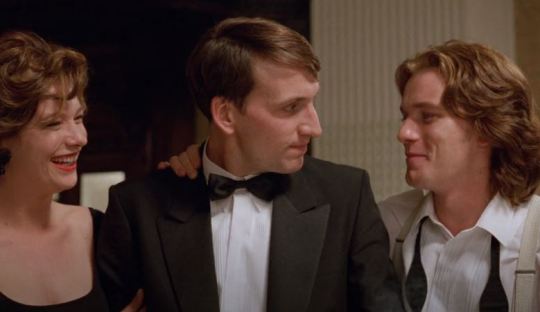
Overt references to queerness:
When we look at contemporary movies, we often have a knee-jerk reaction to dismiss any “funny” references to queerness or sexuality to be taken as jokes and nothing further than that. Unfortunately, this has become all too common, and does a disservice to the films we watch. So I will be taking every moment of referenced or implied queerness as serious, even if it is delivered in a humorous way. Especially because this movie is not meant to be a comedy (despite some humorous moments).
Furthermore, references to queerness in movies should be taken seriously because they establish not only the existence of queerness (in universe, as one might say), but can also demonstrate the character’s attitudes towards queerness. Its important to notice that at no point in this movie are any references to queerness played for a laugh – they might be humorous, but we are not meant to laugh at the character for being queer, which indicates that queerness is taken seriously within the universe of the movie (or at least between the characters).
The first overt reference to queerness is when Juliet asks an interviewee if he is having an affair with a man or a woman and the man is not given screen time to answer. This same man bursts into tears after Alex, a man, says, “When did anyone last say to you these exact words, ‘you are the sunshine of my life’?” (this is a reference to the Stevie Wonder song of the same name). While it is technically (according to the script) said by Alex to a different interviewee, the arrangement of the shots does not indicate that, as it cuts directly from Alex asking the question to the man crying. This could imply a number of things.
The second overt reference to queerness comes at the charity ball, where a Scotsman says, “ladies and gentlemen, and those of you who are neither or both,” which is then met with a drumroll. Alex immediately responds, offended, “where did they dig him up?” implying that Alex finds the joke to be outdated and, perhaps, distasteful.
The third overt reference is when Alex dresses in drag. He also appears in the same scene, on the tape recording wearing some rather flamboyant costumes. The fact that Alex is in drag is not addressed by any of the other characters, nor by Alex, indicates that this is either a usual occurrence, or, for some reason, entirely unremarkable to the characters. Specifically, it is interesting that David does not comment on it, as he walks into the scene unsuspecting.
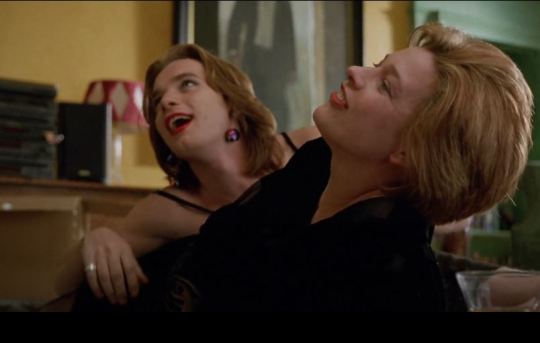
The fourth, and final, overt reference to queerness is when, upon being told of Juliet and David’s relationship, Alex says to Juliet, “I’d do exactly the same thing except I don’t think I’m his type.” If the line is interpreted sarcastically (which I think most viewers will) then we can assume that he is jealous of David for being with Juliet. If it is interpreted as earnest, then we can assume that he is jealous of Juliet for being with David. It also could be an ambiguous combination of both.
Queer Subtext:
Now let us dig into the subtext, which I actually find to be much juicier....
The Squash Scene and the Car
Directly after the interviews have concluded, we are given a scene which helps frame the relationship between the three characters as one built on dynamics of domination and submission and gives us a baseline to understand each of the character’s roles within this dynamic. This scene takes place on the Squash court.
There is a deviation here between the script and the film, as several lines have been cut, but I will include them as they add some context to the scene.
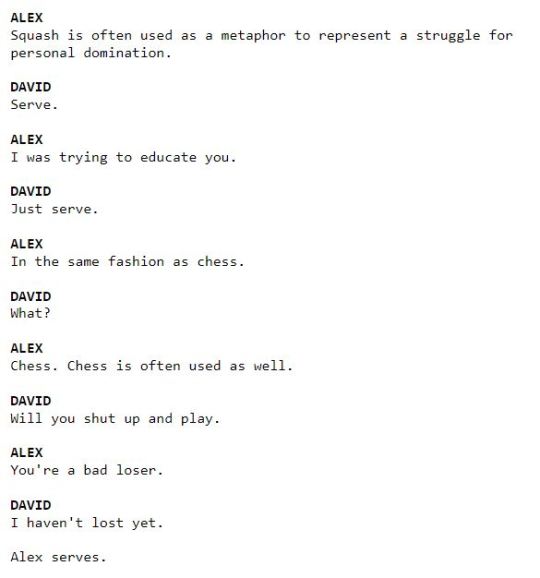
In the above text, Alex indicates that he sees this game of squash as a struggle for dominance. In this case, the game between Alex and David is won by Alex, who then, despite having called David a “bad loser,” demonstrates that he is a sore winner when he gloats over David by saying, “defeat, defeat, defeat – sporting, personal, financial, professional, sexual, and everything.”
David is clearly annoyed by this and storms off. This scene sets up the ongoing power dynamic between Alex and David in which Alex is the dominant one in the relationship. It also is the first time that we see David being emasculated by Alex, which will continue occurring for the first half of the movie.
Immediately after David leaves the court, Juliet takes his place to play a match against Alex. In this scene she is wearing a rather masculine outfit which is similar to that of the two male characters. She also sports short hair throughout the movie, but this is the scene in which she appears the most “boyish.” When she enters the court to play, Alex begins to make the same statement (“Did you know squash is-”) that he made (in the script) earlier, to David. Thus he is using this exercise as a way to exert dominance, not only over David, his male sexual rival, but also over Juliet, thus implying that she is on equal footing – therefore also a sexual rival. However, Juliet cuts him off and tells him, “Alex, just serve.”

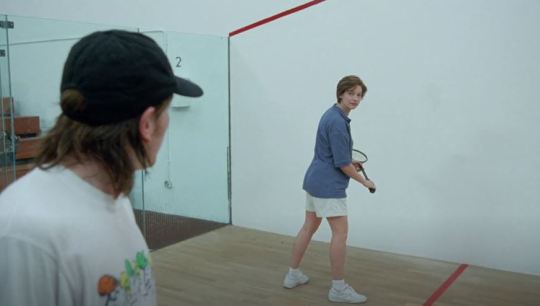
The action of cutting off Alex denies him domination in that moment, thus establishing that the two of them are on much more equal footing, or possibly that Juliet is in fact the dominant one between the two of them. This scene serves to establish that typical gendered dynamics are somewhat blurred between these three individuals, and that David, instead of Juliet, takes on the most feminine/passive role in the group.
The next scene once again highlights the complicated gender and power dynamics within the group. Juliet drives the car (masculine) while Alex and David bicker with one another from the back seat and passenger seat, respectively.
In this scene, addressing Alex’s win, David says, “Victory is the same as defeat – it’s giving into destructive competitive urges,” which distances him from competition, and could be interpreted as him rejecting the masculine urge to dominate. Alex, in return, emasculates him by belittling his reliance on a “discussion group,” (implied to be therapy). During this scene, Alex and David are looking at one another, however, the rear-view mirror blocks both of their eyes. This symbolizes their unwillingness to see “eye-to-eye and perhaps a certain level of repression between the two of them. Also in this scene, Juliet physically dominates Alex by elbowing him in the chest, and attempts to emasculate him verbally by implying that a woman that he is interested in hates him. She does this specifically in response to Alex’s emasculation of David, thus establishing that while Alex might be dominant over David, she is dominant over him. During this exchange, however, in her attempt to protect David from Alex, David is further emasculated because he relies on someone else to defend him.
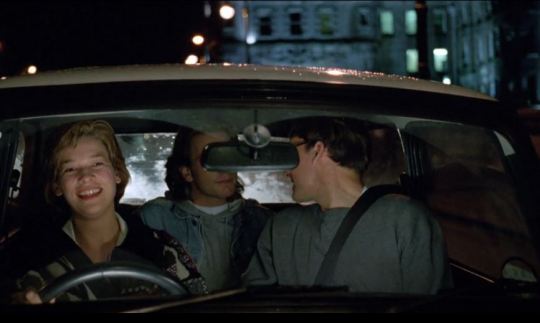
Discovering the Body / Three Friends, Three Bodies
When the trio discovers Hugo’s body we see some more of this interesting dynamic.
David stands by shocked while Alex ransacks the room searching for paraphernalia, while Juliet (the doctor among them) attends to the body.
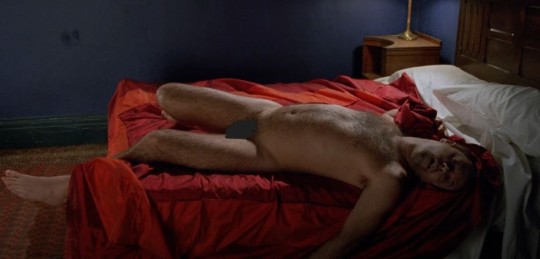
Hugo’s nude corpse in this scene represents male vulnerability. He is prone and exposed on the bed, having overdosed on heroin, and can do nothing while his privacy is violated (by the dominant, Alex). The injection of drugs into the body, in this case, could also be said to symbolize emasculation - the breaking of the body barrier through penetration of a syringe (phallus). This exemplifies a significant cultural fear at the time – death of the male body via penetration, which had become a major concern due to the HIV/AIDS epidemic. (If I was writing this essay for real, this is where I would insert articles that demonstrate horror’s preoccupation with AIDS and gay stuff during the 80s and 90s, but this is just for fun)
David, of course, is enamored by this display of the fragility of the male body. I would suggest that he identifies with Hugo’s vulnerability in death, and that the treatment of Hugo’s body by Alex and Juliet mirrors the way that they treat David. While Alex takes advantage of Hugo’s vulnerability in death by violating his privacy (thus dominating it), Juliet emasculates Hugo’s corpse by tending to it. In one shot, we also see Juliet’s fingers dangerously close to penetrating Hugo’s mouth.
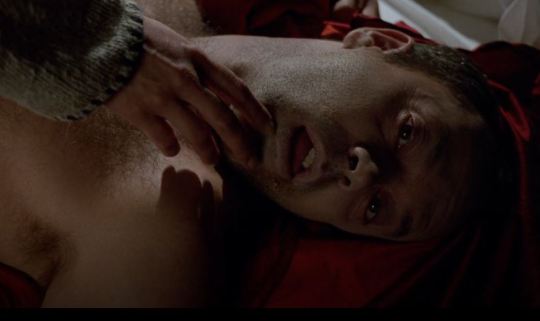
We can also expand upon this by recognizing that the two male characters that are pursuing Hugo and the trio in search of the money, are parallels to Juliet and David. The two men are able to dominate Juliet and Alex through violence, only then to be killed by David. Thus, the three bodies that the trio end up burying are parallels to the trio themselves.
David Overcomes Emasculation, Alex Becomes Emasculated.
Alex’s emasculation of David continues throughout the first half of the movie, culminating in David being forced to dismember Hugo’s body (the very body that he identifies with). When this occurs, he becomes the violator/aggressor/dominator.
This occurrence proceeds the change in the group dynamic. Around the midpoint of the movie (during the charity ball) we see David transition into a dominant role in the trio, while Alex becomes submissive.
This is demonstrated first by Juliet dominating Alex while they dance. Alex falls to the floor, drunk, and Juliet takes that moment to step on Alex’s mouth, forcing him to lick the bottom of her shoe. He then willingly kisses her ankle, meeting her eye contact submissively. It is made clear through his facial expressions and laughter, that he finds joy in this act, thus embracing the emasculation (whereas David had always responded poorly, rejecting it).
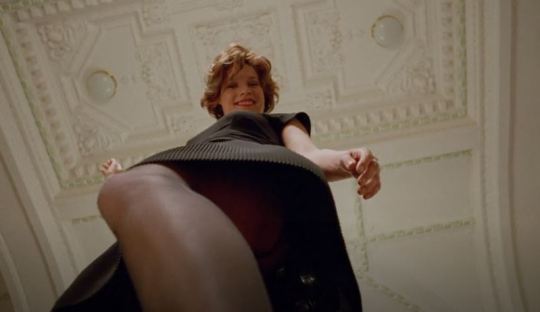
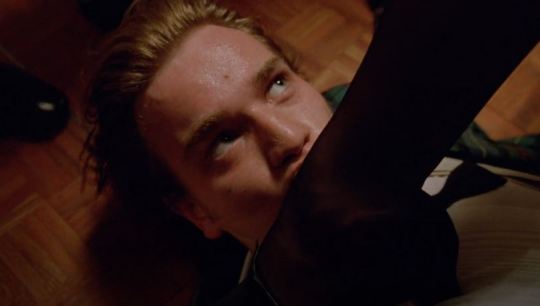
Alex then attempts to re-exert control over David by forcing him to toast when he doesn’t want to. David eventually concedes after Alex yells at him, demanding that he toast to “love and happiness forever.” (Alex also humiliates and emasculates Cameron in this scene).
David finally exerts control when Brian McKenly (a man keen on pursuing Juliet) interrupts their conversation. David responds by standing on level with Brian and stating, “If you want to talk to my girlfriend, you talk to me first. If you want to dance with her, you apply in writing three weeks in advance or you end up inside of a fucking bin bag. You didn’t apply – so you don’t dance!”
While David shrinks a bit afterwards, admitting that he found the interaction stressful, both Juliet and Alex embrace him, in high spirits (one might say… aroused…). Alex exclaims, “He [David] was really good – fucking bin bag – I really liked that. You really explored your maleness to the full there! You were magnificent.” This statement indicates that Alex, who has rarely had an encouraging word for David over the course of the movie, is invigorated upon seeing that David has stepped into a dominant role, exerting his masculinity onto others. Immediately following this, Alex is assaulted in the bathroom by Cameron (who he had emasculated twice prior) and two other men, who beat him quite badly, thus emasculating Alex.
The following day, Alex’s emasculation is made complete when he dresses in drag and spends the day in debauchery with Juliet. The framing of his and Juliet’s bodies during this scene is also worth noting, as they are often visually indistinguishable from one another – with Alex being noticeably more feminine than Juliet in several shots due to his makeup, jewelry, dress, and rather delicate shoulders.
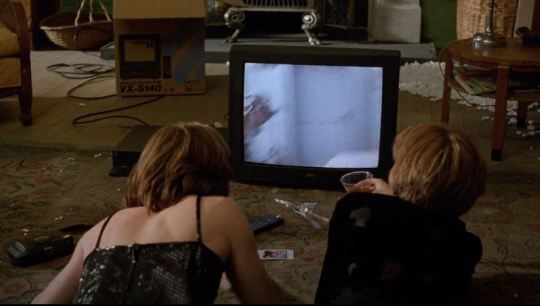
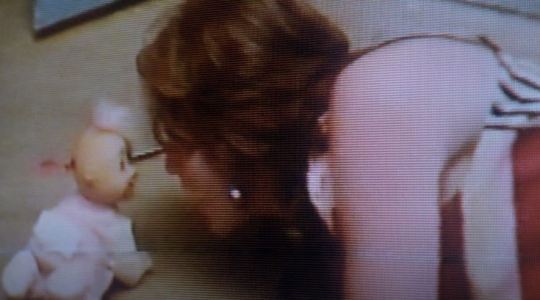
(Notably, during the entirety of the ball scene and much of the drag/video scene, Alex is often pictured smoking a cigar instead of his usual cigarette, which could be said to stand in for a phallus.)
From this point on, David is almost always dominant over Alex. (One notable exception is one moment where Alex leans in close to David during dinner and orders, “now swallow,” while making very intense eye contact. David regains control by reminding Alex that David was the one who dismembered Hugo’s body.)
After this point it is clear that David is undergoing some extreme psychological stress, and has become paranoid and aggressive. His shift in demeanor is most clearly symbolized by this shot, where he calls out of work so that he can begin making plans to protect the cash.
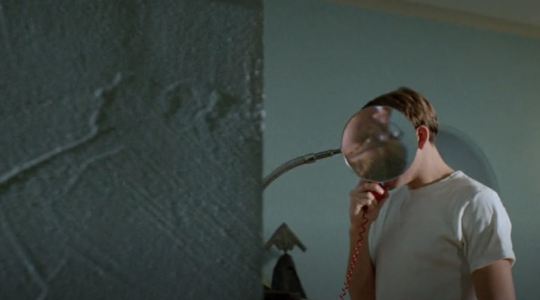
The Wickerman
During one scene, an injured Alex lays on the couch and watches the final scene of The Wickerman (1973).
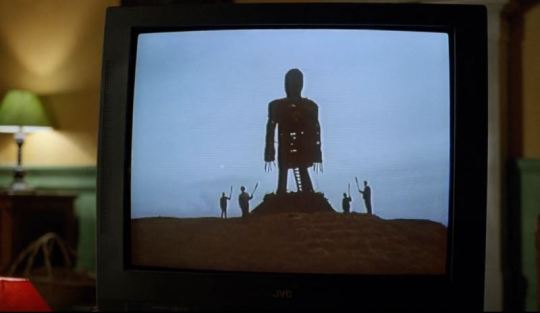
The Wickerman tells the tale of a conservative Christian police officer who goes to a Scottish isle to investigate the disappearance of a girl, only to discover that the locals are practicing a form of paganism that involves human sacrifice. The police officer discovers that he is in fact the sacrifice. It is implied that he is the sacrifice because he is a virgin and a heterosexual, and he is unwilling to have sex with Christopher Lee’s character. Christopher Lee was most well known at the time for playing the lead in Dracula (1958) – another movie with extremely well documented queer subtext. The audience of The Wickerman would have been aware of this.
During this scene, the drumbeats of the pagan ritual, where the police officer is being marched to his execution/sacrifice, synchronizes with David’s steps overhead, a sound that the characters and the audience come to associate with surveillance and dread.
Honestly this scene has me a bit stumped. Who does Alex identify with in this situation? The heterosexual victim? – is the ending subverted because his submission culminates in… the penetration of Alex's body… thus making him queer? Idk it's been a long day.
Surveillance
During the second half of the movie, David moves into the Attic and rarely comes down when his housemates are home. He is protecting the money, both from his housemates and from the men who eventually come looking for it. While Alex and Juliet are brutalized by the men, David is the one who has set a trap for them, and is able to kill them. He also leads the trio to dispose of the bodies, and drives the van (whereas Alex had driven the van the first time they disposed of the bodies, when he had been the dominant one in the relationship).
During his time in the attic, David drills holes in the ceiling so that he can spy on his housemates. He is literally in a dominant position over them, looking down on them while they go about their daily tasks. In one scene, he spies on Alex and Juliet while they are sleeping. In this scene, he is shown first to be watching Alex. David is also in a state of undress that we have not seen before, implying a certain sensuality to the observation. We do not get to see Alex in a state of undress, but the scene finishes with Alex putting his shoes on, the camera looking down from above, implying David’s Point of view, and that he had watched the whole time. After Alex leaves, David moves to watch Juliet, in a scene that is much longer and more explicitly inappropriate and sexualized, especially because we come to understand that David’s temporary attic bed is located directly over her bed. However, before she begins undressing, he looks away and holds his head in his hands.
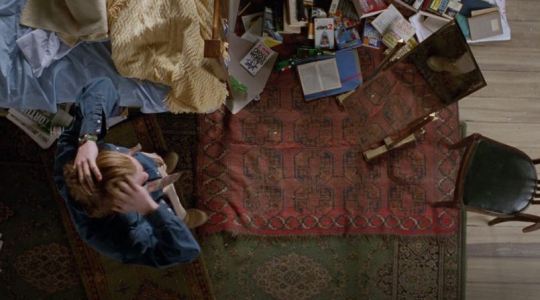
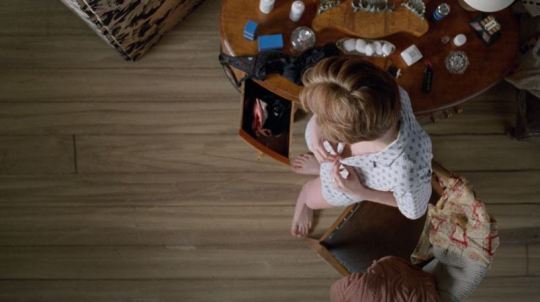
This scene simultaneously offers us a leveling effect between the two objects of David’s gaze (Alex and Juliet), while simultaneously prioritizing the heterosexual coupling. However, the implication that there is shame associated with the heterosexual gaze, complicates the situation.
Penetration with the Drill (Phallus)
When Alex goes into the attic to look for the money (and finds it in the water tank), he climbs back down the ladder only to be confronted by David, who is holding a drill (phallus) as a weapon. Alex’s hands are wet from the water, and he frantically wipes them on the seat of his pants, behind his back, visually placing his hands as a barrier to his anus. The Drill makes contact with Alex's head and breaks the skin in an act of penetration (the body barrier is broken). This is the first scene in which David directly engages in domination (and penetration) of Alex.
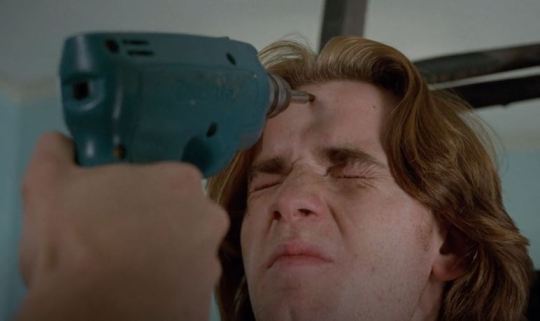
David’s Glasses and Alex’s Photo
Lenses, mirrors, and portals/doorways are deeply significant visual aids in this movie, but I want to highlight the one that stood out to me the most. When Juliet and David have (implied) sex, at which point they solidify their status as a couple, David removes his glasses, and places them on Juliet’s bedside table. Underneath the glasses is a photo of Alex in costume, a cigar in his mouth, framed through the lens of the glasses. The photo was taken on the day in which we see Alex at his most feminine, at a point where he had been thoroughly emasculated (beaten in a bathroom by a man that he had emasculated multiple times). The framing of the photo, through the lens of David’s glasses implies that this is how David sees Alex – costumed, emasculated, and with a phallus in his mouth.
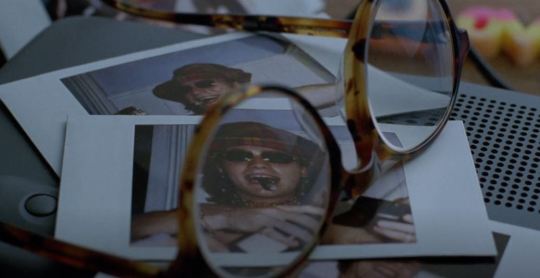
This photo is also shown once more in the film; David holds the photo of Alex as he lies in his attic bed, and he pins it above his head so he can look at it. The scene cuts to Alex, also in bed, who then gets up. It once again cuts back to David, who also gets up, and we see that Juliet lies asleep next to him. This follows a pattern of shots that we’ve seen before in the film (see the Surveillance section), where we see David watching Alex in what could be interpreted as a sexual or romantic way, before the camera reveals Juliet and lingers significantly. The implication is that whatever there is between David and Alex always gives way to the relationship between David and Juliet.
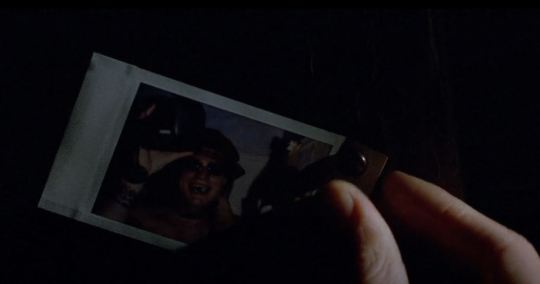
Returning to the glasses - the final time that we see them is during the climax of the movie. The three characters are struggling against one another, and David’s head is forced into the refrigerator so that Alex can try and smash him with the door. He manages to throw Alex off, but not before his glasses are caught on the shelf of the refrigerator, thus knocking them off his face. Having David’s glasses be knocked off would not typically be significant in a fight scene such as this, however the camera goes out of its way to linger on this shot, indicating that the symbolism here is important. The other time that we have seen David remove his glasses has been before he has (implied) sex with Juliet. In this case, the removal of the glasses occurs just before David pins Alex in his final act of domination, which then culminates in the ultimate symbolic act of sexual penetration – David stabbing Alex with a knife (phallus).
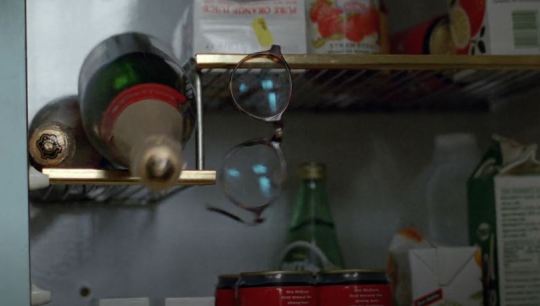
NOTE: David is also pictured without glasses at the beginning of the film, where he is lying on his back, and halfway through the film, after he has dismembered Hugo in a symbolic act of violence against his own vulnerability. In the first scene we hear his monologue; “I’m not ashamed, I’ve known love, I’ve known rejection. I’m not afraid to declare my feelings. Take trust for instance, or friendship. These are the important things in life. These are the things that matter, that help you on your way. If you can’t trust your friends well, then what then? What then? This could have been any city, but all the same.” It is unclear until the end, but it seems that the first time that we see David, right at the beginning, we are actually seeing him postmortem in the morgue. Meaning that the monologue is a lament on his life... (You're not ashamed of what, David? Being a bit gay, perhaps?)
Penetration with the Knife (Phallus)
At the climax of the movie, after David’s glasses have been removed, we arrive at David’s final act of domination over Alex. David pins Alex to the floor by sitting on his stomach, with Alex’s legs pinned underneath his knees in a position that could be interpreted as sexual. He then holds Alex by the throat, and stabs him in the shoulder, slicing clean through and penetrating the floor. The act of stabbing (penetrating) a victim with a knife (phallus) is one often noted in analysis of horror films, as having sexual implications (again – I’d find some article about it here if I was a serious writer lol).
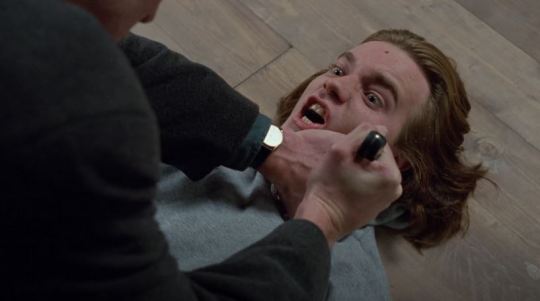
Before David can stab Alex again with a second knife, David is stabbed with a knife through the throat from behind by Juliet. Thus Juliet, who has been a dominant character throughout the movie, is symbolically penetrating David with a phallus. Furthermore, the location of the stabbing in the throat and from behind, implies that David has now suffered, once again, an emasculation, just as he had just preformed on Alex.
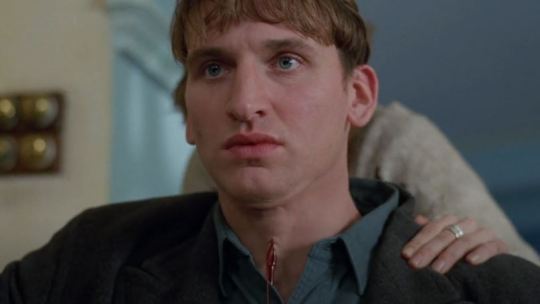
David collapses and dies, just as Hugo did, from emasculation through the body barrier being broken from penetration. Thus, David’s identification with Hugo’s corpse and the vulnerability that it represented, is complete in this moment.
Juliet then kneels over Alex, taking up the same position that David had just occupied, and places her hand on the knife in Alex’s shoulder, pressing on it, thus taking David’s place as the one to dominate Alex. She then removes her shoe, and in an act that mirrors the scene from the charity ball in which she dominated Alex by having him lick her shoe/foot, she uses her shoe to hit the knife three times, driving it deeper into his shoulder, further penetrating him. Thus, in her final interaction with both David, and Alex, she has penetrated them.
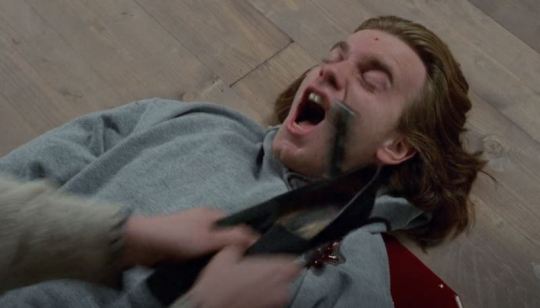
As she puts her shoe back on, we can see inside of the refrigerator, where we once again see David’s glasses, recalling once again that this scene is coded as sexual in nature through the movie's visual language.
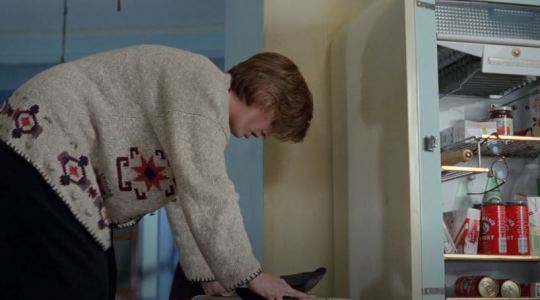
As the movie closes, we discover that Alex is alive (probably), and that he has hidden the money underneath the floorboard. In the ultimate irony of the movie, the character that spent the second half of the movie being coded as the submissive (homosexual receiving) partner, has come out on top, despite the other two character’s attempt to dominate (and kill) him.
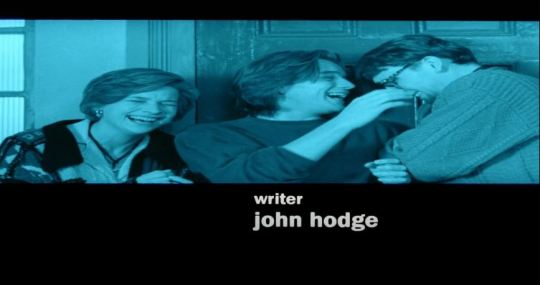
Uhhh the credits roll, and they're all shown as they were in the first scene of the movie, smiling, laughing, and the love song "Happy Heart" plays...
#shallow grave#ewan mcgregor#i can't believe i wrote 7 pages of this#lmfao#this is for you loycspotting#cw: blood#CW: stabbing#cw: nudity#cw: murder
71 notes
·
View notes
Note
What do you mean they’re playing both sides? I have the same thoughts, but I’d like to hear your take on it if you don’t mind
Oh, careful what you wish for. I love these kinds of questions and usually use them as an excuse to go on particularly long rants.
What I'm referring to specifically here is some tweets I saw screenshots of in the 911 tag earlier and that made me think: "Oh the buddie baiting is strong in this one." There are different levels to this, different players or stakeholders if you will each with their own agenda.
First we have the interviewer. If he wanted to actually focus on Eddie as an individual character you'd think he'd at least mention Eddie's child by name. I mean, nobody has spoken the names "Marisol", "Kim" or "Shannon" all season - Christopher is the part of this story line they've decided to focus on so far and basically all of Eddie's important scenes in 8a featured a conversation with or about Chris. But instead of bringing that up the interviewer makes sure to specifically mention that he asked about "what's going on between [...] Eddie & Buck" and in a follow-up tweet even promises that not once in his interview were they described as "brothers". The clickbait could not be more obvious, he's pandering to a very specific sub-group of the fandom here. This is an interview for the Buddie shippers. People who care about Eddie's development outside of the shipping question? They can cope without details. It's a Ryan Guzman interview, what more do you need to know?
This has become very normal for 911 related interviews in a way, at least as far as Oliver Stark and Ryan Guzman are concerned. Them not being asked about the ship has become the exception, interviews with at least one Buddie question are the norm. Even other cast and crew members get asked about this on a regular basis, especially Tim Minear. And I sort of get it, I don't like or approve of these clickbait articles, but I get the logic behind it. These online tv articles are mostly read by fans who spend time online as fans and shippers make up a big part of that crowd. There have been many Buddie themed interviews and so far it hasn't meant anything or led anywhere.
This ambiguity also means that Ryan Guzman himself went into the interview with the intention of keeping Buddie shippers' hopes up (no judgement intended). Last year we got several interviews in which he mentioned how important it is to him to portray the "friendship" between a "straight" and a "bisexual" man, etc. In this newest interview he seems to be aiming for a different tone - or at least so the interviewer suggests in his tweets. Why would Ryan Guzman change or adjust his stance on this topic? Probably because Tim Minear or somebody else with similar amount of relevance told him to.
Actors do not just say whatever they like in these interviews. They are told by the higher-ups if there are important things they should bring up or, the other way around, if there are things they absolute cannot say. If "the powers that be" of 911 didn't want the Buddie shippers to think there's something going on then they would take a clearer stance (and they wouldn't film scenes like that leaked good-bye hug out in the open). Then again the interviewer highlights the "open" answers he got from RG, so I'm almost sure that there is nothing in that interview that would actually indicate imminent Buddie canon to anyone looking at it at least a little objectively. Keeping us guessing is keeping the buzz alive in the long run and that's what they need more than anything: For the show to be talked about.
In-universe there are also Buck's and Eddie's unfinished story lines to consider. Eddie is still a complete mess and Buck has not stopped baking or thinking about Tommy yet. Not that 911 has been writing particularly sensible plots recently, but throwing a new relationship into the mix on top of everything else doesn't make much sense to me.
Thinking further into the future, I don't even think that Buddie has zero chances and is under no circumstances ever going to happen. Personally I think that maybe no final decision has been made about it yet either way and everyone involved acts and speaks accordingly.
That's an interesting philosophical question though: Is it still baiting if the 911 gods themselves don't know what they're going to do yet?
I put a cut here because I got side tracked thinking about why I don't believe Buddie will go canon unless the show is about to end.
Eddie and Buck are the two characters on the show where the writers still have a lot of wiggle room in regards of where their journeys are going. Athena and Bobby are going to stay married and keep doing their jobs because otherwise what is the show going to do with them? Hen will stay married with kids, she'll keep her job with the 118 and maybe they'll bring back the work vs. family conflict (the show has been very uncreative in writing exciting stories for her), but what else are they going to do with her character? Chimney and Maddie are going to stay together, they're married now, they have a second kid on the way - what more is the show going to do with them?
There will be short story lines about struggles or disasters or maybe some fun B-plots, but that's it. The show is not going to kill off or break up any of these couples. Maybe Athena or Bobby or both of them will retire / take a desk job shortly before the show ends for good, but until then they won't make any major changes to their lives. Same goes for job opportunities for Hen and Chim. Hen might take over as Captain of the 118 eventually, Chim might take a job at the academy, but none of that is going to happen before the show ends for good because they can't very well split the 118 up before then. Maddie might become floor manager or something, but she needs to stay with the call centre because 911 needs a main character at the call centre to keep functioning.
Either way, a happy end for all 5 of will include them staying with the partner they've been with since forever, still doing the job they love and have had since forever (maybe pepper in a well earned promotion or retirement towards the end) and still being part of the firefam that has existed since forever. We know where their stories end because they're already there.
Buck and Eddie? There is room here, but only if they keep the Buddie question unanswered for now. The very second those two get together we'll know they're endgame - just like we new Madney would be endgame the second they met and just like we knew Bathena would stick together from the start. The moment they answer the Buddie question with "yes", they close every and each opportunity on any surprise twists with serious long term effects. With every other love interest there would be a "will they or won't they last" phase, but Buddie? If they actually went canon then the answer would be "they will". We could still watch Buddie pass the relationship milestones, but there wouldn't be anymore big surprises. 911 would have all their main characters backed into corners with no more room for actual twists to their stories and what kind of show would that be?
Right now we know nothing. Buck might end up dating a woman again. He could end up with a guy. Or a non-binary third option. He might end up moving out of the loft for a different reason. He could decide to adopt a kid without having a partner. Eddie might decide to stay single and concentrate on other things. He might go to therapy again, finally bury Shannon's ghost. The point is we don't know yet, anything could happen and that's part of what keeps the show exciting.
Aside from "keeping their options fluid", the show might also tread carefully on account of the (current) political climate in the US. The show is often described, praised even as very diverse, but is it really?
All the important female characters on the show are married and have children. Actually all the couples are married and have (step) children. Many of the the female characters' story lines revolve around being caretakers: For Carla it's literally her job, Abby is taking care of her mother, Ana is a teacher and Eddie dates her in an attempt to replace his wife, Hen & Karen always get settled with a custody battle story line, Eva only ever comes back to stir up trouble because of Denny, Shannon to this day is mostly the mother of his child in Eddie's mind.
There's exactly one disabled character who is still a child and logically not a first responder. Mental illnesses like Eddie's ptsd and Maddie's ppd are very temporary struggles that can be dropped when a plot line is over and not chronic illnesses. [This makes a little sense for Maddie's ppd, but she also mentions in 5x12 that she has often struggled with depression and suicidal ideation since Daniel died. Yet we never see her have a depressive episode outside tof the season 5 arc.] Buck's chronic pain issues post-ladder truck explosion are purely fanon and Bobby's chronic back pain is only mentioned in a single flashback.
The only religious characters are (Catholic) Christians.
Recently the show has focused a lot on the characters in their nuclear families instead of strengthening the friendships, I'm far from the first or only person to have noticed that.
They gave Captain Arsehole Gerrard a make-over in between seasons which turned him from a slur-spouting bigot into a grumpy grandpa who got his own happy ending working on a tv show with an actor he admires while Ortiz, a woman of colour in a political leadership position, was revealed to be the devil incarnate who got all the blame and all the punishment. Not sure I would've done it that way.
Then there is of course the never-ending copaganda.
Specifically on the topic of queer 911 characters: Until very recently the show had only one type of queer character: "Cut and dried cases" of homosexual characters who appeared rather gender-conforming, led amatonormative life styles (married with kids) and as black characters were already part of 911's "woke agenda" anyway, if I may put it that drastically. Oh, and Josh was there, but as Maddie's personal gay bbf / sidekick with barely any story lines for himself he isn't exactly ground breaking representation in my humble opinion. Of course it's still great to have these characters, especially a couple of black lesbians, but up until season 7 911 represented only gender- and amatonormal gays and lesbians. No trans characters, no aro or ace characters, no m-spec characters, no polyam characters, no ambiguously/unlabeled queer characters. I wanted to point that out.
Now we also have Buck which I count as a big win. They took thee cis-het white man of the show and made him queer 7 seasons into the show. There was some backlash about this last year though and I really am doubtful that 911 would turn both their young single macho men queer while they're already wrestling with slowly declining viewing figures and getting their frankly ridiculous budget approved which they need to keep this show running. That all on top of the recent and ongoing political events. DEI who?
Again, I'm not saying there is no way, but even if they do want to get there (Buddie canon) eventually - if the show wants to keep running for a couple more seasons they will probably wait before making any irreversible decisions on Eddie's sexuality. Until then they will allow more Buddie centric interviews and give vague non-answers, appeasing both people who don't want the ship to go canon and those who want nothing more.
17 notes
·
View notes
Note
1, 4, 8, 15 for the ask game - SEPHESIS
1. Which one is the better cook:
Genesis, hands-down, but only because Sephiroth was never given the opportunity to do much of his own cooking. His diet was strictly regimented by Hojo for basically Sephiroth's entire life, so while he was "home" his meals were delivered in carefully marked packages that he kept in the fridge, and while he was in the field he mostly had MREs like everyone else. Meanwhile, Genesis' biggest contribution to the planet is related to food processing, so he definitely knows his way around a kitchen.
In a better world, where they get their slice-of-life epilogue at some point, Sephiroth helps Genesis in the kitchen often enough that he eventually more or less catches up—although he plays a little fast and loose with measurements and ingredient substitutions, so Genesis will always be better at baking.
4. What they do on date night:
Sephiroth and Genesis are really into movies, although they have to be a bit careful in preparation because of issues with volume—they both have enhanced senses, so they have little specialized earplugs that they wear when they go to the theater. Live shows are easier on both of them, so they go see stage plays when there's something interesting going on. Sephiroth finds it's much easier to suspend his disbelief with a film than a play, though, so they tend to lean more for movies.
They also both like watching competitive fighting, specifically live, never professional, expressly to snark at each other about the poor form in competitors of the amateur scene. Lots of wincing and "Oh, that could have been handled better." They basically never refer to this activity as a date, but they do always go out to dinner after—even if it's just dropping in at some hole in the wall local restaurant and sharing an appetizer—so it is undeniably a date.
8. What they argue about:
While I could say "what don't they argue about?" the fact of the matter is that they actually get along really well. Genesis' snarkiness rarely breeds any kind of argument, and Sephiroth is quite agreeable when it all comes down to it—he's been brought up to do what he's told, and doesn't have a particularly dominating personality when he's himself.
The thing they do tend to argue about, which they've always argued about, is the other's willingness to advocate for himself. Lots of "I can't believe you let them talk to you that way!" and "You know better than to agree to something like that!" and "What possessed you to do something so dangerous?!" The response is generally something along the lines of "What choice did I have?" and that turns it into an argument. They've done this since they were teenagers.
15. What they would change about each other:
There is nothing about Sephiroth that Genesis would change. Nothing. Even the things that annoy him, even the things that break his heart, there's nothing about him that Genesis would want to be any other way—he'd like to change the world around him to keep the worse things from happening, to him, but Sephiroth himself is untouchable. It's not even that Genesis sees him as perfect, either, it's that he loves him completely, flaws and all.
There's one thing that Sephiroth would change about Genesis, but only one. When they were in their mid-teens, not long after they'd first met, Genesis realized that Sephiroth getting into any kind of trouble or engaging in any misbehavior for which he got "caught" would lead him to getting pretty fucked over by Hojo in response, with the Professor attempting to condition the poor behavior out of him by any means necessary. Hollander was never as hard on Genesis as Hojo was on Sephiroth, so Genesis took to making sure of two things:
If Sephiroth ever got into trouble, Genesis would get into trouble with him;
Any trouble they got into would be very clearly indicated to be Genesis' fault in its entirety.
So whenever they got caught being the menaces that they were, Genesis would talk himself into taking the fall, and thereby talk Sephiroth out of it. This eventually led to Sephiroth receiving praise for ostensibly always being there to try to keep Genesis out of trouble, even if he could be caught in the crossfire. What a noble young man! Such a sense of responsibility! Truly, a leader in the making!
This continued on into adulthood, clear up until the point that Genesis defected in Wutai, and Sephiroth hated it. Not because he didn't appreciate being literally tortured in Hojo's lab less often, mind you, and not because he didn't realize that Genesis was protecting him; because there was nothing he could do to make him stop, no way to pay him back, and no way to explain to anyone that Genesis wasn't the only loose cannon in the firsts, he wasn't the bad seed everyone thought he was. Even if he tried to tell the truth, which he did on multiple occasions, the assumption was always that the heroic Sephiroth was just trying to fall on the sword for his horrible friend's sake, and it never amounted to anything.
If Sephiroth could change anything about Genesis, it would be to make him stop that.
(For the ship asks game.)
#sephiroth#genesis rhapsodos#sephesis#sephgen#final fantasy 7#ff7#crisis core#ccff7r#headcanon warning#ask game
22 notes
·
View notes
Note
in the interest of debate:
so i saw your post about the accords, and i do want to state that in agents of shield it's expanded upon a little. anyone with superpowers is supposed to be forced to "register", aka write down their name and info, which then backfires when an anti-inhuman group gets info. i agree that the accords as stated in civil war make sense and with the UN signing especially, but i do want to note that in the wider MCU they sometimes have negative effects. because, you know, making anyone in a specific subgroup have to register themselves on a government-run list isn't great?
i don't really have any questions, just wanted to note. :)
@luxaii is referring to this post.
See, that's the thing. I've heard this argument before in terms of the comics, that apparently in the comics the accords were combined with a mutant registration act which obviously is a terrible idea. This seems to be MCU's way of including that bit without having mutants in MCU because they didn't have the rights to them.
The trouble is that they didn't explain this in the movie itself or have any indication that this was the case. We even have scenes where Steve questions whether he should support this or not and it never comes up.
And I can't really take something "well they fixed this in X show made later" or "this was originally in the comics" as an argument within the film itself. Not the least of which because these things are always somehow in the thing I didn't read or the thing I didn't watch.
#mcu#anti mcu#captain america winter soldier#anti captain americal winter soldier#agents of shield#meta#headcanon#opinion#luxaii
20 notes
·
View notes
Text
A Parallel World
Last time I talked about Doctor Who, we met Rose's father, Pete, who died when she was 6 months old. That episode prompted me to watch a 2-parter in which Pete returns, only this time he's from a parallel universe. Let's talk about:
Season 2, Episode 6: The Rise of the Cyberman, and Episode 7: The Age of Steel
The general premise of these episodes is the Doctor, Rose, and her sort-of boyfriend Mickey find themselves crashed in a parallel world. There, they stumble into the nefarious plans of a scientist named John Lumic, who’s attempting to turn the entire population of the world — staring with Great Britain — into Cybermen.
We open on a scene with Lumic and a fellow scientist unveiling one of the very first successful Cybermen. A Cyberman is sort of like a robot, but rather than being built purely from metal, they’re an “evolution” of, in this case, humans. The human brain is slotted into a metal exoskeleton, making them a living thing.
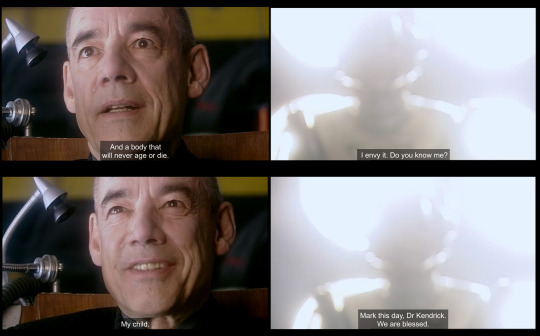
Okay, Brenner-ass bitch. Even saying "blessed," something so close to the "miracle"-type language we get from Patty in TFS re: Henry's powers? Sure.
Lumic wants to go straight ahead with their plans to convert more people, but Dr. Kendrick reminds him that they need to get "Geneva's approval" due to its status as a new life-form. Lumic, however, knows that it'll be rejected, but he's hellbent on going ahead with it anyway. This experiment is a means to save himself in his declining health, and he'll be damned if anyone gets in his way.
He has the Cyberman kill Dr. Kendrick and decides to move ahead on his own.
We then cut to the Tardis, where we find the Doctor and Rose regaling tales of their travels to Rose's boyfriend, Mickey, while he holds down a button on the Tardis's control panel at the Doctor's request. The Doctor sheepishly admits he could've stopped holding it about a half hour ago, and after Mickey lets go of it, the Tardis lurches and starts going haywire. The Doctor frantically tries to regain control, but the Tardis's panels aren't reading the time vortex at all. He shouts that it's impossible, but it's just gone.
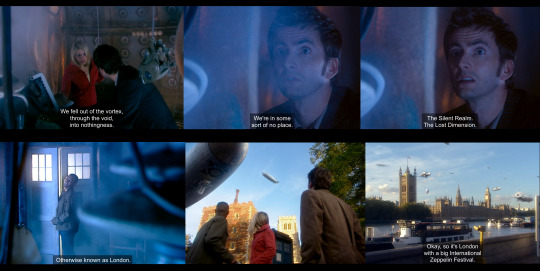
This honestly just makes me laugh, specifically the "Otherwise known as London" in conjunction with all the TFS promo about a "portal opening in London" etc. Also, the zeppelins are such a nice touch because of how Fringe does the same thing. I'm not sure if Fringe did it as a reference to this, because it's a trope that appears to happen in other shows, at least per my meager research. But given that Fringe began airing in 2008 and this episode of DW aired in 2006, I wouldn't be surprised.
Also, I know @aemiron-main has spoken about the UD as it possibly exists as an "in-between" place, which I can't find the original posts about, but he discusses here. I also recommend checking out Stav @heroesbyler's posts, like this one, about the void and differences between it and the "real world."
The Doctor says this isn't their world, and Mickey is the first to suggest parallel worlds, referencing the concept as it exists in films. That's when Rose notices a street advertisement of Pete, holding up some health drink and saying his catchphrase “You can trust me on this,” indicating that he's still alive in this world. The Doctor tells her that she absolutely cannot go see him, because he likely has his own Jackie and his own Rose, "His own daughter who is someone else, but not you."
Today, as it happens, is Jackie’s birthday (February 1st), and she and Pete are setting up her birthday party at their swanky mansion due to this world’s Pete’s entrepreneurial success. It’s her 40th, but she insists she wants to tell everyone it’s her 39th. Something something weird ages something something dates being just slightly wrong something something she wanted her birthday to be the same as a celebrity so specific dates are important. Here, we also learn about the EarPods that everyone is wearing, Jackie gloating that Lumic sent her a diamond-studded version of the latest model for her birthday. We’ll learn more about these later, but for the time being, just think of them like a cross between bluetooth headphones and Neuralink.
We return to the Doctor and Mickey, who are sitting in the darkened, dead Tardis wondering how they’re going to leave.
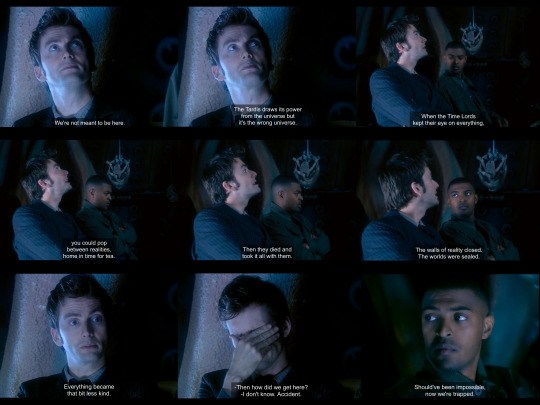
“The worlds were sealed” really popped out at me. While we don’t know when or how the UD and Dimension X were created in ST or if they’ve been there this whole time simply locked away, it’s interesting to imagine that there could inevitably be a harmonious existence between worlds, especially with what the Doctor says here about things becoming “less kind.”
It pulls on a similar idea from Fringe, wherein the two shown universes begin colliding, and with two universes being shoved into the space of one, they start conflicting with each other in highly catastrophic ways. Before that point, things existed harmoniously, with our characters even able to view this parallel universe without issue. It was when meddling began, including lots of hopping between universes (sometimes for selfish reasons) without understanding what it would do, that the problems started. Ultimately, all is solved by permanently separating the universes again, barring travel between the two forever. Which, and I’ll talk about this in a future post, is interesting when taking into account how the parallel worlds in DW interact with each other in the future, including forcibly keeping characters apart/having the two worlds be barred from one another unless massive amounts of energy are used to link them, and, even then, only temporarily.
I’m curious to see how all our dimensions in ST interact with each other and if the solution will be keeping their communication in check, or if they’ll have to be sealed off entirely. I’m of the belief that destroying the UD is not the way to go as a solution to anything in ST5, and I highly doubt they’re headed that way anyway, but only time will tell how it’ll really shake out.
As the Doctor and Mickey talk, the Doctor spots something: a little speck of light down in the grating of the Tardis’s floor. Though it’s small, it means they’ve got power, and, thus, a way to get home. They need more power though, but specifically power from their universe. The Doctor, being the one source of that available to them, gives away 10 years of his life to this little glowing power cell, putting it on a 24-hour recharge loop that, once completed, will give them enough juice to hop back home.
Meanwhile, Lumic has sent one of his henchmen, Mr. Crane, on a “recruitment drive” for his Cybermen experiment. He drives to a homeless encampment outside the city in a freight truck marked as “International Electromatics,” which doesn’t match the name of Lumic’s company, Cybus Industries. The henchman gathers the homeless men, claiming he has hot food for all of them in the back of the truck. Many rush to him, but one is stopped by a young man with a camcorder telling him to reconsider.
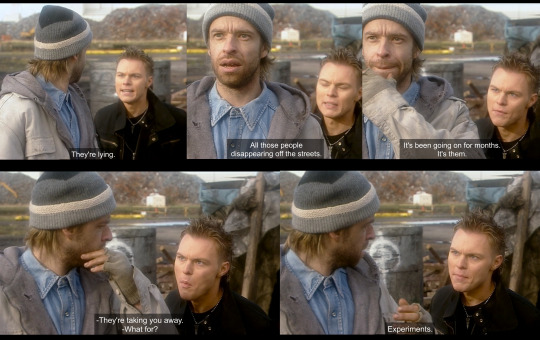
The man brushes him off and goes to the truck. Once he steps inside, however, he seems to realize what’s really going on, but he’s grabbed and wrangled behind some hanging plastic sheets as the doors shut, leaving us only to hear the screams of the men inside.
Lumic’s entire operation is very HNL coded, if you couldn’t tell. It’s even tied into the Russian presence in ST3, what with the both of them working under the guise of a different company name in order to skirt under the noses of the public. But here, specifically, it’s obviously reminiscent of HNL stealing kids to experiment on/with, especially under the guise of it being helpful.
The Doctor and Mickey find Rose, who’s been reading up on her dad in this universe after her cell phone was automatically connected to the Cybus Network, which is basically just a specific kind of internet access made by Lumic’s company.

“You can’t become their daughter” okayyyy alternate selves filling in gaps where they “should” be. The "wrong" kid being stuck into circumstances they were never meant to. Surely nothing to think too hard about. With a name like Peter involved too? Completely unimportant.
With their 24 hours to kill, Rose goes off to see Pete and Jackie, the Doctor right on her heels, while Mickey goes to visit his grandmother. In their world, his grandmother died several years prior, so with the understanding that Pete is still alive, Mickey is curious to know if his parental figure is still around, too. However, as he comes up on his neighborhood, he finds a roadblock. He asks if he can enter.
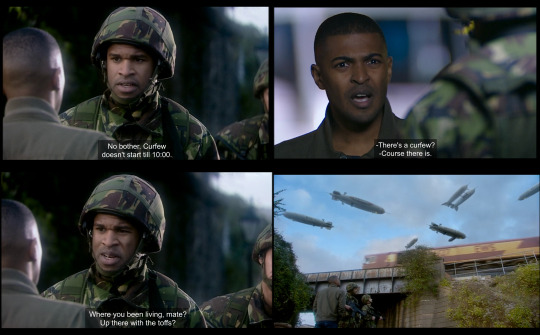
“Lessons begin promptly at 10:00.” … sorry, I had to.
We really don’t get much into the socio-economics of this world, but, as it’s easy to see, there’s a clear disparity between the classes, and the average citizen is strictly surveilled and poorly treated.
Mickey does find his grandmother, still alive, but, here, she calls him Ricky.

Boy, if you don’t quit it with the name swapping and taking roles… something about TFS Henry likely being Edward and taking on a role that possibly isn't his own...
His grandmother complains about his friends and him getting into trouble when Mickey gets suddenly scooped up by a mysterious van, driven by a woman and accompanied by the young man who tried to save the homeless men. They speak to Mickey like they know him, scolding him for speaking to his family when he supposedly said doing so would be dangerous. He runs with it, opting to let them share their intel.
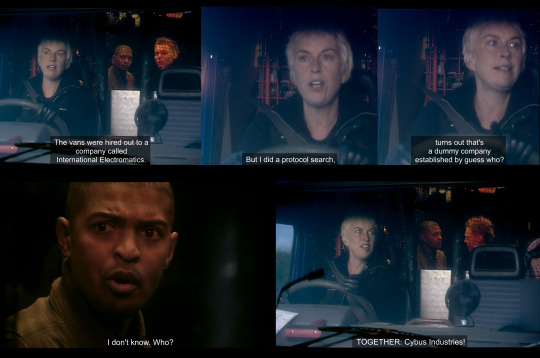
Always gotta have a "who?" moment...
As Rose and the Doctor head to the Tyler household, the crowd of people around them suddenly freezes as all of their EarPods begin beeping. Rose’s phone, connected to the network, also begins beeping and showing what everyone else’s EarPods are receiving.
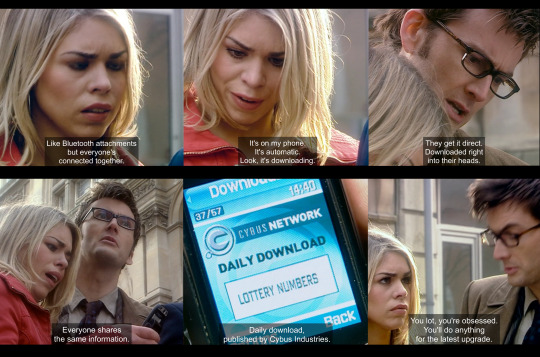
Color me surprised when we get a hivemind reference even in these episodes. Because why wouldn’t we?
It turns out that Cybus owns most of the companies in Britain, including Pete’s. As soon as the “download” is done, everyone goes back about their business as if nothing happened, and Rose and the Doctor watch in bafflement before continuing on their trek.
We then get a scene of Lumic meeting with the President of Britain (remember, alternate universe!) in order to gain approval for his Cyberman invention. He speaks about the human brain being “the most precious thing on this earth” and “yet we allow it to die.” Through his invention, he’d be able to sustain the brain “indefinitely.” This would be “the ultimate upgrade” and “Our greatest step into cyberspace.” Disturbed, the President asks him to stop his presentation.
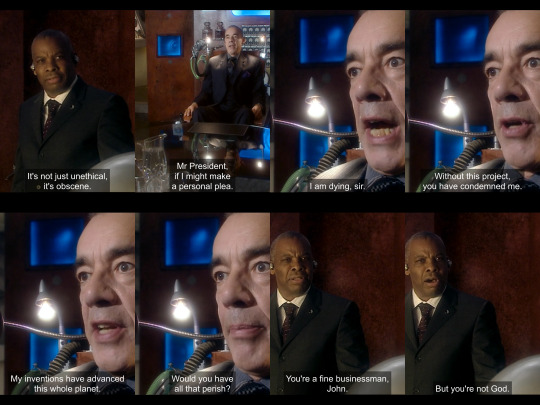
It’s kind of giving Brenner’s “I did everything for you” moment to El in ST4, claiming that all that he did was for the greater good, and should that all be cast aside? Here, Lumic’s goal on the surface is to better humanity, but he has selfish reasons for pursuing it as well. We get hints of Brenner’s selfishness, with it being much more overt in ST4 and in the VR game, in which Vecna and Henry, respectively, call him out for using the kids as a means to seek out greatness for himself. Not to mention the idea that Brenner may have been using Henry, at the very least, to find some sort of means of immortality or regeneration, just like Lumic is doing here.
Referring to Lumic as “God” really jumped out at me, specifically irt things James @henrysglock has spoken of extensively regarding the religious imagery/coding of various characters. We get a lot of it with Vecna and One, but there’s also endless religious coding for Brenner, specifically in the role of a priest/father. While that’s also not specifically God, it’s not a stretch to consider on-screen Brenner as “God” in the sense that he’s creating these children in his lab to be used for his own purposes.
Also, I’d be remiss to not at least touch on the mention of “cyberspace.” Again, I’m genuinely surprised that we get a hivemind-esque aspect in these episodes that contain myriad other similarities to ST. It’s not really emphasized that the Cybermen can communicate with each other/are all connected in the way the UD creatures are in ST, but they do all experience the same lack of emotion and have one shared goal, and they can all be simultaneously communicated to via Lumic’s transmitter. It’s akin to the flayed in ST3, following the idea of them existing in their daily lives before being “activated.”
Despite the President’s explicit rejection of Lumic’s plan, Lumic once again goes behind the backs of authority and asks Mr. Crane to move their plans forward — “I am governed by greater laws, old friend. The right of a man to survive.” Using the homeless men from before, now equipped with EarPods that leave them blank and pliant, he orders them into surgical chambers which, though we don’t have a reveal yet, put their brains into the Cybermen exoskeletons. They, along with many others that have been made from the “vagrants” they’ve grabbed off the streets, are loaded up into trucks to be transported. When one of the drivers concernedly asks what they are, Crane says “I’m told they’re the future. Ain’t technology wonderful?”
Honestly, Crane gives me lowkey Owens vibes. While he doesn’t have as much (supposed) kindness as Owens does and is still rather cold like Lumic, his demeanor is very casually playful by comparison. Unfortunately he doesn’t show up too much throughout the episodes, but he does progress the plot substantially again later, also in a semi-Owens way.
Now let’s check up on Mickey, shall we?
So, he’s been not-kidnapped by these two folks in a van, but when they return to their hideout, they find… Mickey already there.
But, if we remember, this is actually the previously mentioned Ricky, Mickey’s parallel world counterpart. Realizing Mickey isn’t who they thought, the three of them strip him and tie him up in a chair to search for bugs, of which they find none.

Okay Henward… cloning and brothers but also just being alternate versions of the same guy… surely nothing to see here.
Mickey learns that these three — Ricky, Jake, and Mrs. Moore — are part of an underground rebellion called the Preachers — “As in ‘gospel truth’”, as Ricky puts it, since they don’t wear EarPods. He says they’ve got “freedom” compared to everyone else who gets downloads from Cybus, which is so... haha wow okay fourth-wall-breaking sentient Henry in NINA helping El learn that HNL is a prison. As we saw in the earlier scene of Rose and the Doctor on the street, it might be hyperbolic, but "freedom" isn't far off. Everyone being hooked up to the same system, being fed the same information at the same time every day, and being closely monitored at all times? Slight Soteria reference, I see you…
Then, Mrs. Moore, their techie, interrupts with news that they got “an upload from Gemini,” who tells them that the vans (containing the Cybermen) are moving. Gemini is someone working with them from inside Cybus — a double agent — but they don’t know who that person actually is.
Now we return to Rose and the Doctor, who’ve snuck into Jackie’s birthday party disguised as waitstaff. The Doctor takes a moment to tell Rose that she “can’t stay. Even if there was some way of telling them.” Rose immediately dispels the possibility, since she has her actual mother back at home, but she does lament that this Pete and Jackie “have each other,” while her Jackie has “no one.”
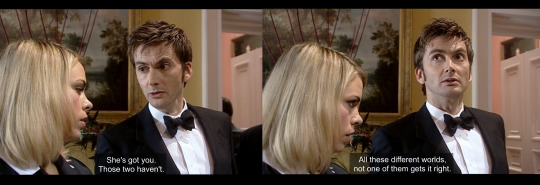
Something something a universe where none of this bad stuff ever happened.
Rose finds her way toward Pete to talk to him — obviously not giving herself away and simply making small-talk — and, similar to the other episode I linked at the top of this post, Pete finds himself sharing personal information with Rose and has a “have we met before?” moment. Again, despite not knowing who she is, and even though she’s not even from this universe, there’s an automatic connection that he feels.
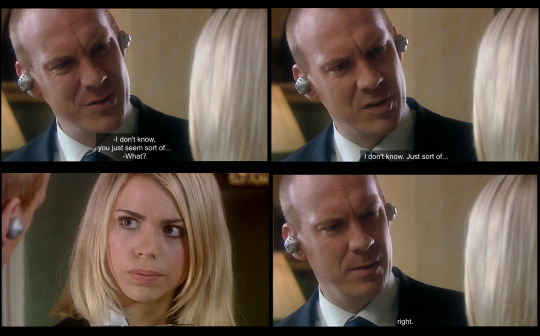
Rose even tries to talk to Jackie, and, since she’s posed as a waitress, asks if she can get her anything, to which Jackie responds “The last 20 years back.” Yeah, I’d bet Henward would like that too.
Ultimately, after having a tender moment, indicating that this version of Jackie also feels a connection, Rose tries to convince Jackie to give Pete another chance, since she learned from Pete that the two were having marital problems and Pete had even moved out, they just haven’t made it public. Rose believes Pete to be a really wonderful guy, same as always, but the forwardness of her comment sets Jackie off, who verbally berates her for sticking her nose where it shouldn’t be when she’s “just the help.”
Here we also begin to learn that the Tyler residence is where the Cybermen are headed. Pete, with his company owned by Lumic, works closely with him — the Preachers call him a “henchman” and “traitor to the state” — but that also means he’s been interacting regularly with the President, who is in attendance at Jackie’s birthday, who also just rejected Lumic’s plans for the Cybermen. I assume you can see where this is going.
The Cybermen are released onto the property, where they promptly surround the house and start breaking inside to round up everyone. While the Cybermen are new to this universe, the Doctor recognizes them from his own — they’re from the original run of DW, which I haven’t seen, but we see the dismembered head of one in a season 1 episode, which Rose and the Doctor even call back to here.
Lumic, though not physically present in the room, speaks to everyone inside the house and, specifically, to the President.
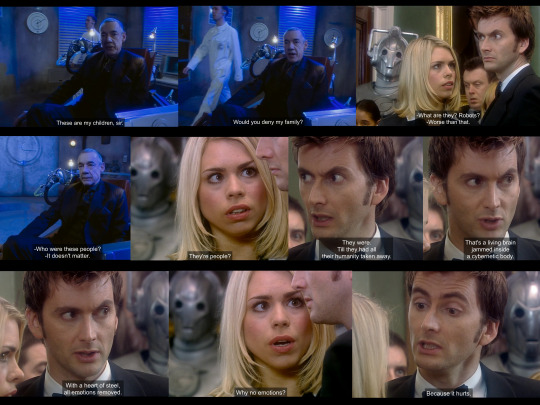
Lumic argues that they were “homeless and wretched and useless, until I saved them, and elevated them, and gave them life eternal.” One of the Cybermen speaks, saying “We have been upgraded.” When the Doctor asks into what, it answers that it’s “The next level of mankind … You will become like us.” When the President asks what would happen if he refused the upgrade, despite the Doctor insisting that’s a bad idea, the Cyberman says he will be “deleted,” and promptly kills him via electrocution with its hand to his shoulder.
Do you see what I’m seeing? Are we seeing the 4.07 monologue parallels? One tells Eleven that she’s better than everyone else and he can help her get even further, that they can change the world to be what they want, and when she refuses, he tries to kill her. I also just think it’s neat that, while they’re not exact copies, Lumic being more Brenner-coded while the Cybermen are like One in the monologue… okay we get it, that wasn’t really One and he was just a husk for Brenner to puppet in NINA.
With the President dead, everyone panics and begins trying to flee, while Lumic orders the Cybermen to kill anyone who refuses and round up the rest. The Doctor and Rose flee outside alongside Pete, catching up with Mickey and the Preachers, who have guns and try to shoot down the Cybermen as they’re all surrounded. The Doctor warns them that bullets won’t stop them, however, and we see this in action with the Cybermen being entirely unfazed while they’re shot. Okay, Vecna.
Trapped, the Doctor orders everyone to put their hands up and says they’re surrendering, explaining “There’s no need to damage us. We’re good stock.” Doooon’t say that word!!! Don’t get that close to the HNL breeding program terminology!!!
However, the Cybermen claim they’re “rogue elements,” “incompatible,” and “inferior,” and therefore must be deleted.
Which, I haven’t really touched on that yet, but isn’t it curious that the Cybermen use the word “delete” rather than something like “kill” or “eliminate”? Searching around, it seems that this was something introduced in these episodes, so it’s not standard to Cybermen across the entire series, and it doesn’t even regularly continue when they appear in later episodes. However, while it ostensibly is a stand-in for “kill,” the use of a different word, specifically one more correlated to something like cyberspace and a digital realm, has me staring hard at NINA. To bring up Fringe again, it even makes me think of Peter being wiped from the timeline, something more akin to “deleted” since he wasn’t actually killed.
Stuck under threat of death, the Doctor uses the little power cell from the Tardis to hit the Cybermen with a beam of his energy, which…

Sure, disintegrate them, see if I care. Whatever.
Now able to escape, the whole lot of them pile into the Preachers’ van and drive off. There, Pete admits that he’s Gemini — the one who’s been giving the Preachers their inside information, though he was under the impression he was communicating with security services, not "Scooby Doo and his gang."
Lumic speaks to several of the Cybermen now, calling them “My everlasting children” and asking them how “it” feels.
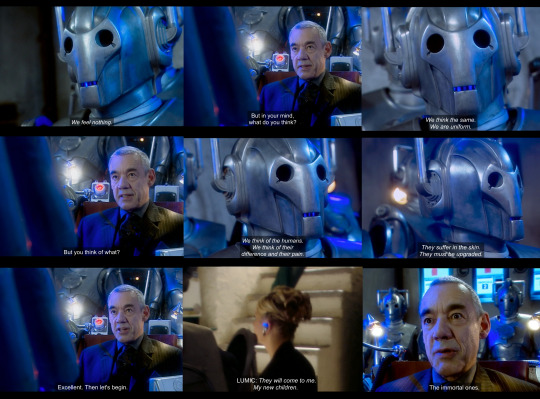
Okay mister “you must not rely on emotions” and claiming that it will lead to failure if they use them to boost their powers, whatever you say.
At this point, it’s also very clear that the Cybermen are further reminiscent of massacre One with the lab kids, and Vecna with his whole “end your suffering” schtick that just amounts to killing his victims. Like, that sure is a way to end suffering, bud. Even if the Cybermen aren’t actually dead, as we’ve established, the humans inside of them are entirely stripped of their emotions and autonomy, which does technically lead to a sort of “end to suffering,” if you give it that angle.
Pete explains to the gang that “This all started out as a way of prolonging life, keeping the brain alive. At any cost.”, which Lumic claims is the one part of the body that “makes us human.” Having since removed their EarPods, all of them watch in horror as everyone who was wearing EarPods are activated and made to herd themselves toward the big Cybus factory where they’ll be made into Cybermen.
However, Mr. Crane roughly pulls out his EarPods before he can be turned into a mindless drone. Lumic is slightly disappointed by this when Crane comes to him afterward, but Crane says he wants to willingly offer himself for an upgrade. However, as soon as he gets close to Lumic, he begins ripping out the life support attached to the wheelchair he uses (“Are mommy and daddy fighting again?”). A Cyberman intervenes and kills Crane, but the damage has already been done.
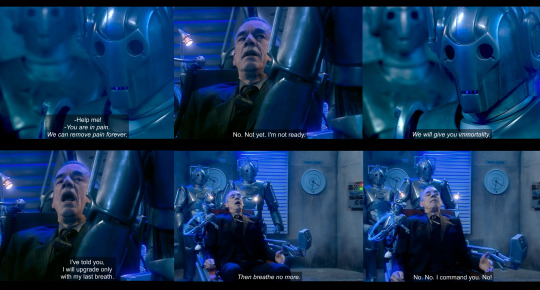
Reminds me a lot of Brenner’s “bit off more than he could chew” tendencies. Like Lumic, he can control things only to a certain point, the only difference here being that Lumic’s situation is with the intent to help him, while Brenner’s is/would be a matter of creating something stronger than what he can control. However, it does make me think of the Brenner/One merge theory as well. Could there potentially be a sequence of events where, in Brenner's search for greatness, he is unwillingly, literally brought up to that level of greatness via some sort of merge with his favorite test subject? And, as a result, it ultimately destroys who he was, despite his desire to reach this point?
Then we get a really fun shot coincidence.
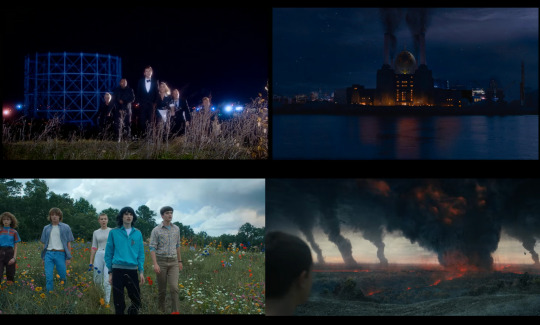
I also want to interject with a brief sidenote here. When I was plotting out this post, I found myself having to jump back and forth a lot. Many of the scenes as I've outlined are actually way more split up, with most of the different people interactions we get "overlapping" with each other. I realized it's because it's a very similar style to how ST operates, wherein there's several groups of people who are all working on different parts of the plot simultaneously, resulting in scene sequences getting "interrupted" by each other, before they finally converge and realize they've all got different information to help with the same situation. And I just thought that was a neat similarity! It's not something that happens often in DW, given that usually there's not this many "main" characters in any given episode and it's usually only the Doctor and their companion(s).
Anyway, Rose and Pete want to break into the factory to try and find Jackie, who they rightfully assume was taken to be upgraded, though they’re not sure if they can save her/if it's too late.
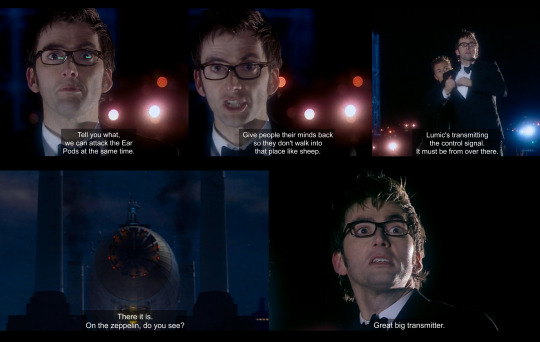
Not sheep……….
Now, Rose and Pete go off donning fake EarPods to sneak into the factory to find Jackie; Mickey and Jake go together to try and shut down the transmitter on the zeppelin; sadly, Ricky was killed by Cybermen while they were trying to flee the Tyler residence; and the Doctor and Mrs. Moore team up to go down into the cooling tunnels beneath the factory in order to enter from below to shut everything down. At this point, the entire lasting population of London has gathered inside the factory against their will, and they must stop it before they’re all converted.
The Doctor and Mrs. Moore make their way to the cooling tunnels, which they find lined with rows upon rows of inactive Cybermen. The Doctor asks her how she found herself in her current position with the Preachers, and she says she “used to be ordinary” (there’s that word again, we LOVE that word) and she even used to work at Cybus Industries.
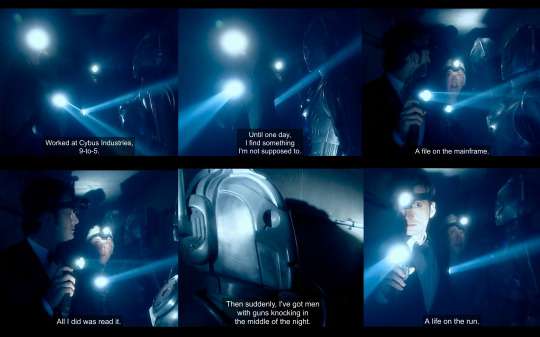
Gotta love going down into an underground maintenance area while discussing truth and lies and escape. Hasn't happened anywhere else before.
When the Doctor asks her about “Mr. Moore” she explains that “he’s not called Moore” and she simply got that from a book — “It’s safer not to use real names.” She essentially faked her own death in order to keep her husband and kids safe.
Meanwhile, Pete and Rose are caught in the factory after showing emotion — they’d found Jackie, who had, unfortunately, since been turned into a Cyberman. Rather than be killed, though, the Cybermen recognize Pete as someone who worked with Lumic to create their species, and therefore decide to take him and Rose to be upgraded.
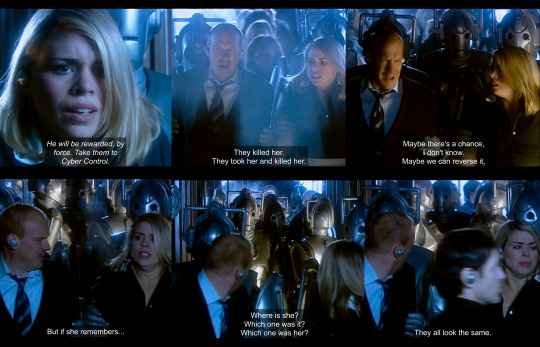
This aspect of their conversion is interesting to me, specifically the “she remembers” part of it. Because, yes, she does remember who she is; she herself confirms to them that she “once … was Jacqueline Tyler.” However, it’s not really her. On a physical level, obviously, but even still mentally, it’s barely Jackie. It even refers to Jackie in the past tense, saying it was Jackie rather than is. It's kind of giving "I'm normal. I'm Henry Creel" lol, like, okay, sure you are.
Let’s briefly touch on the whereabouts of Mickey and Jake. They’ve made their way to the zeppelin, where Mickey convinces Jake to simply knock out the guards at the entrance rather than kill them because then “what’s the difference between you and a Cyberman?” Usually I argue against this sort of rhetoric, because it’s just kind of stupid (“you’re no better than me!!1!” bro just kill the baddie it’s fine). However, we want to remember our emphasis on compassion, especially as it involves people who are either entirely innocent of or under the influence by the actual bad person. Mickey understands that there’s no point in avoidable death, even if these people are aiding in the eradication of the population of Earth — he doesn’t want to be part of it if it involves the murder of someone simply twisted up in a bogus system they have no control over. Something something circumstances make the man. The two of them find the computer controls, where Mickey begins tapping into the Cybus network to find a solution.
Returning to the Doctor and Mrs. Moore, Lumic is alerted to their presence in the tunnels, and so he begins waking up the dormant Cybermen to chase them. They manage to escape, crawling up out of the tunnels and shutting the door over the Cybermen making their way up the ladder. They then, however, come face-to-face with another, which Mrs. Moore incapacitates with an electromagnetic bomb.
This allows them the chance to get up close and personal with the suit. The Doctor opens its “heart of steel” to get into its chest, where they find it filled with flesh — a central nervous system which was artificially grown and then “threaded throughout the suit so it responds like a living thing.” Which, the Doctor clarifies, is what it is: a living thing.
Then he points out a small black chip within the chest plate.
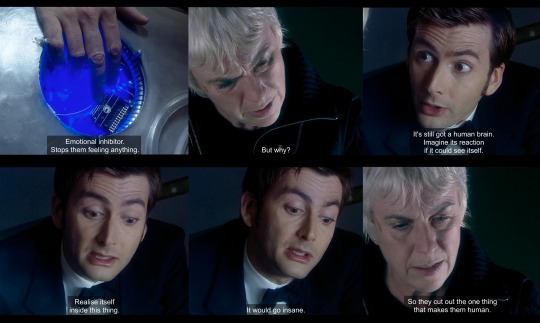
The Cyberman then “wakes up” and asks why it’s so cold. The bomb broke the inhibitor, which is now allowing the human inside it to feel, which the Doctor apologizes profusely for. After learning her original name, he puts her to sleep so she won’t have to suffer in this new body.
This gives the Doctor the realization that that’s the answer to their problem: if they want to stop the Cybermen, they should aim for the emotional inhibitor, the key. All they’d have to do is find its cancellation code and feed it into the Cybus network, making them all realize what they are and kill them.
Just then, however, another Cyberman appears and kills Mrs. Moore. It senses the Doctor’s binary vascular system (two hearts), however, and deems him an “unknown upgrade” and will need to be analyzed.
So, he, Rose, and Pete all find themselves captive together once more. Lumic, now converted into a "superior" Cyberman — "designated Cyber controller" — reveals himself to them. Very early on in the episode, Lumic speaks on his experiments and, in an attempt to dispel rumors that his health is declining, talks about how his mind is "more creative than ever." In his new Cybersuit, he tells the Doctor that "London has fallen, so shall the world" and he shall bring everlasting peace, unity, and uniformity to the world so they never have to experience pain and suffering again.
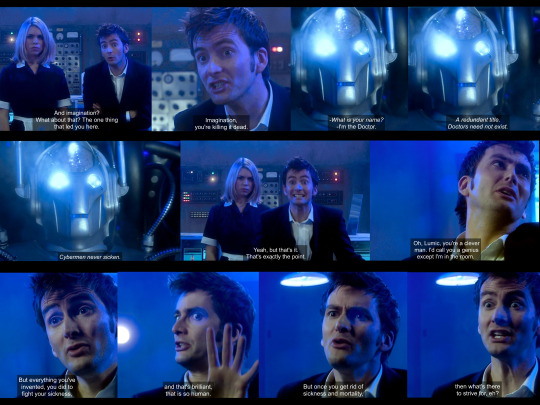
The Doctor says that now the Cybermen will never advance, they’ll “just stop” and stay stagnant forever. He says that, in that world, the planet will lack the one thing that makes it so alive: “Ordinary, stupid, brilliant people.” I spoke extensively about the importance of the “ordinary” in my last DW post, so I’ll simply link that here again rather than talk your head off about it, lol.
Lumic asks the Doctor if he’s “proud of [his] emotions” and he gives an enthusiastic “yes.”
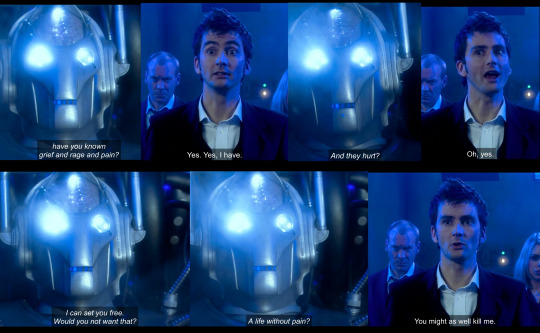
Um, Duffers… Tom MacRae called and he wants his ST3 Jim Hopper letter monologue back.
Emotions are good, even the nasty ones. Especially the nasty ones, because that’s what makes you alive.
Lumic says then, sure, he’ll simply kill the Doctor, but the Doctor shouts that that’s not his decision to make, and he “[doesn’t] control [him] or anything with blood in its heart.” Lumic threatens him with his army of Cybermen, but the Doctor argues against him.
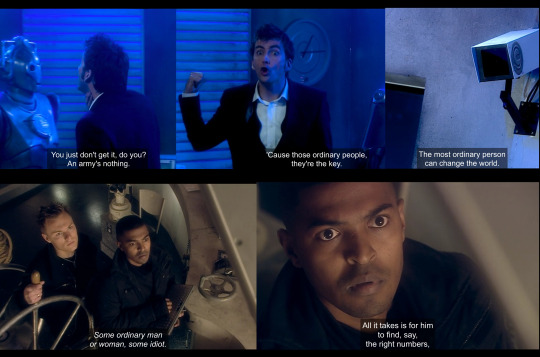
Absolutely insane to me to call ordinary people the key. See again my last post about the importance of ordinary people, and this post (among others) about the importance of the word key as it exists in ST, and thus the tie to ordinary compassion being the key to solving our Vecna problem.
Mickey, with the Doctor’s help, plugs in the numbers for the cancellation code at his computer, which causes the emotional inhibitors in all of the Cybermen to cease functioning, which causes all of them to fall into hysterics. One stares at its reflection in a metal panel as it moans in agony, and the Doctor apologizes. The rest of the victims, those who hadn’t been converted yet, are free to escape with their EarPods now functionless.
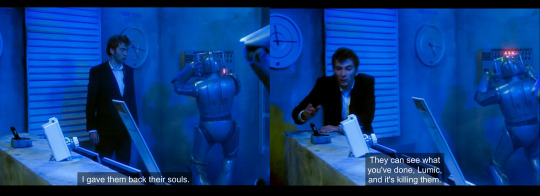
With the Cybermen neutralized, the Doctor flees with Pete and Rose to head to the roof. They make it, but so does Lumic as he grapples up after them on the rope ladder to the zeppelin. However, with some help by cutting one of the ropes, he gets knocked off and falls to his death atop the roof of the burning Cybus factory.
The rest of them manage to escape, and Pete finally really asks who Rose is. She explains that she’s his daughter from another world, and he seems put off and overwhelmed by this. When she calls him “dad” in an effort to get him to come with her, he appears to panic and hurries off, telling her that he has to work on shutting down the rest of the Cybus factories across the globe.
Even Mickey decides to stick around in this parallel world, seeing as he has his grandmother here to take care of, and with Rose traveling with the Doctor, he’s become a bit of a third wheel anyway (specifically "the tin dog," an inside joke about the Doctor's old robot dog, K-9, which I won't get into here but... we love our dog talk here at ST, don't we?). He tells Jake, however, that he’s “a different man, I’m not replacing [Ricky].” Once again, I want to point to the whole "I'm Henry Creel" thing in TFS and the concept of Henry and Edward swapping, literally, or at least being "swapped" by way of being shown interchangeably on-screen, etc. etc.
The Doctor brings Rose back home to see Jackie, who’s surprised when Rose rushes her for a big hug.

Whew! Are you still with me? We’re in the home stretch, I promise. Time for some last thoughts!
The first thing I want to touch on is the concept of the Cybermen in general, but also as they were adapted for these episodes in particular.
The main objective of Cybermen, as indicated in these episodes, is a desire for survival and immortality. This slightly changes between iterations of the Cybermen across the whole series, but, as the fandom wiki puts it, “they were often born out of a human civilization’s, or an individual’s, fear for survival,” which even included threats like poverty or degradation of their planet, which, speaking specifically to the “poverty” aspect, is something we see with Lumic claiming that kidnapping the homeless men was helping them.
Cybermen, as we’ve established, also lack emotion. In this iteration, they have their emotions forcibly removed because Lumic sees them as a hindrance (and it keeps them agreeable in Cyberman form), but past iterations involve it being a voluntary part of the conversion process because they “considered [emotions] to be a weakness and instead embraced pure logic.” How borderline-Vulcan of them… but as I previously mentioned, it’s similar to the sentiment Brenner expresses in the ST4 NINA sequences, wherein he warns the kids against relying on emotions to strengthen their powers.
While some Cybermen had names or monikers, most were only individualized by ranks or numbers. All of them, however, wanted to fully conquer their universes to ensure survival and would work to convert any “compatible” life forms to ensure their survival as well. Something something they’re not gone something something they’re still in here with me. Stripping them of their souls but claiming now they’re somewhere better or safer. Sure. Whatever.
Cybermen, despite being considered “life forms,” cannot breed and they only increase their numbers by converting compatible living creatures into Cybermen. Evidently, however, an upgrade was introduced in, as far as I can tell, season 8 of the 2005 DW reboot wherein Cybermen could convert the deceased into Cybermen, no matter the state of their corpse, but this could only occur in a place called the “Nethersphere” which is dubbed a “Matrix-like computer” where the “minds of the dead” were stored until their bodies could be converted. This “Nethersphere” is also called “the Promised Land, Paradise, or Heaven” … aight. Surely nothing to see here irt recent leaks and speculation.
As an additional note, even the stuff about Cybermen being made rather than born has me looking at what's introduced in TFS irt Brenner using Henry's infected blood to do transfusions with other patients to give them the same type of infection/alteration. As we see on screen, it's very clear that at least some of the kids were likely bred from Henry/were actually born into the lab, even if they were from outside mothers like Terry ("outside" meaning "not presently living in the lab"), but TFS partially presents it as children being brought in from the outside to be directly given these transfusions and "turned into" the same "thing" as Henry.
A key point of interest with the Cybermen is that they have no real point of origin. They don’t have a “homeworld” that they’re born from, and instead they crop up across several universes, or even within the same universe, at different times and places simply because the populations there had a parallel desire for security and/or immortality. This has me mulling over stuff such as:
Us still not knowing what the origins of the UD (and Dimension X) is, and whether or not it’s been around forever or if El created it. And thus, in that vein, what’s the origin of the Mind Flayer?
The mere concept of on-screen Brenner, across timelines, seeking out the same kid(s) in order to fulfill his still-unknown final goal, which in itself is interesting… what are his motives? What are his origins? How did we reach creating a child torture dungeon?
Patty being referred to as “the girl from nowhere” and, though having never been mentioned before on screen, carrying immense weight in driving the story of TFS forward, often times by force, at least as it pertains to Henry. Something something her and Henry being connected “whether you like it or not” vs the Cybermen/Lumic forcibly converting people.
Henry, per TFS, is from Rachel, Nevada, despite the town of Rachel having not existed in 1959.
For these specific episodes, the writer, Tom MacRae, wanted to reimagine the Cybermen so they weren’t “mere villains” and instead were “sad figures,” made terrifying because they were forced into being converted rather than outright killed. He said that this would make them “a cross between vampires and zombies.” Please, not two of the monsters wound tightly into the imagery of ST…
He didn’t want these Cybermen to be simple mechanical beings, he wanted them to be as close to human as possible while stripping them of everything that made them as such.
Moving on, I briefly touched on it above, but I once again want to draw special attention to the scene of Lumic being forcibly turned into a Cyberman. As I’ve said, we still don’t know much, if anything, about what Brenner’s goals actually are. Sure, the government probably does genuinely want a leg-up on the Soviets, and these kids are a path to that. They’re funding it, after all! However, come ST4, the government doesn’t seem too happy with their continued existence. Hell, even in TFS, Brenner has a quick line about how the DOD wanted to dispose of Henry, but he convinced them out of it. If that tracks from stage to screen, then there’s some sort of personal stake here for on-screen Brenner. What can I say? The man loves his wife. If you want to see more about why I’m keeping a neat divide between TFS Brenner and on-screen Brenner, peruse @henrysglock’s page and keep an eye out for his big upcoming post that will delve into a lot of that.
Like Brenner using the lab kids to fight the Soviets, Lumic presents his goal as a means to better humanity on a global scale. It’s about preserving the human mind and giving them a reprieve from what he deems to be “suffering.” However, he has the fairly explicit ulterior motive of preserving himself. He’s in poor health, thus this would indefinitely prolong his life and, as the creator of the Cybermen, would put him in charge of every other Cyberman in existence. Again, we don’t know Brenner’s goals, but, as I mentioned above, it does have me staring at the Brenner/One merge theory and the potential for Brenner being somehow mixed up in Vecna, which then creates a neat through-line with Lumic and Vecna’s shared intention to “end suffering,” even if it’s in the most eyebrow-raising and clearly-lying way possible.
It is interesting, however, that Lumic begged to not be turned into a Cyberman. The Doctor said it for him, but Lumic likely understood that once he became a Cyberman, he would no longer be the same man who created the Cybermen. Early in the episode, he speaks of feeling creative, but removing what makes him human also removes that creativity. He wanted to save his conversion for his very last breath, prolonging his human life for as long as possible.
On top of everything else, this leads me to wonder if whatever personal goal Brenner had/has for the lab kids is a double-edged sword. A lot of that comes simply by virtue of the unknown. TFS Brenner wants to make contact with Dimension X/the Shadow, but instances of that often result in carnage. On-screen Brenner (potentially, allegedly, possibly) used El to find Henry “in the darkness,” which resulted in our Mother Gate mess in ST1 that kicked everything off. If Brenner was seeking something like immortality or abilities of his own, would any path to that “greatness” ultimately have a large flip-side that makes him “lesser,” for lack of a better term?
Moving on, I want to further discuss the similarities between Brenner and Lumic and them claiming their arguably heinous methods are “helpful.” In Lumic’s case, he believes that he’s “elevating” the people in the lower rungs of society by creating a world of uniformity, even if it means entirely stripping them of their humanity and freedom. Hell, he has to turn off their emotions so they accept it. Similarly, Brenner claims he’s helping the lab kids and making them stronger, more important, calling them his family and saying he loves them, but somehow that also involves isolation and shock collars. El and One are right to call the lab a prison, but from Brenner’s perspective, he believes he’s doing best by these kids to prepare them for their roles in the world and protecting them from folks on the outside who might abuse them for their powers (yeah, ironic, I know, but that’s also kind of the point, right? When someone else does it, it’s for the wrong reasons, but when he does it…).
Now, I personally don’t doubt that Brenner truly loves the lab children. He’s very distraught during the massacre, and he seems genuinely grief-stricken when he talks about Henry (I couldn't find the more serious version of this post, I'm sorry ghsfjdgk). While he’s using them for expressed and personal gains, it’s clear that the pain he feels at losing them is something more than just “oh, boo-hoo, my experiments are ruined now.” Lumic expresses similar sentiments, and while he’s much farther in the camp of “wow look at my inventions, everyone clap and cheer about how smart I am”/it’s more about being proud of himself, he does still call the Cybermen his children, indicating he does carry a deep fondness for them as his creations.
And I know this sounds contradictory to what I said earlier about them working for their personal gains, but while they might have their selfish reasons, that doesn’t mean the expressed ones aren’t also real, you know? Lumic fully believed that this would be better for humanity as a whole, and Brenner fully believes that this is for the better of his children and the country. They also just both happen to have their own personal stakes in it that give them a little more devotion to their respective projects, even if it backfires in the end.
Now damn. Am I done talking? I think I’m done talking. These two-parters always take a lot more words than I think they will, especially when they offer enough interesting connections and ideas irt ST! There’s little doubt in my mind that the Duffers may have taken these episodes, or the Cybermen in general, as inspiration for HNL and its inhabitants. There’s just too much language surrounding them for it to be a total coincidence. The similar parallel world stuff I can at least concede is by virtue of how parallel world stuff usually works, but the rest of it? I’m looking.
As I mentioned prior, we do get returns of the Cybermen, including in episodes where we also get a return of the parallel world, which I’m planning on delving into soon. But for now, I think this is some interesting stuff to chew on irt how things might shake out in ST5 in conjunction with Brenner, HNL, and his children. Only time will tell!
There's plenty more things I could have touched on, but there's so many little things in these episodes that just had me pointing and going "you see that, right?" It's really great fun, and I wish I had more articulate thoughts on a lot of it, but I know it'll stand out to the folks who read this.
Until next time!
13 notes
·
View notes
Text
Thoughts on Off to Neverland: 70 Years of Disney’s Peter Pan by Jim Korkis
Now that I have finished reading Off to Neverland, I’d like to share some thoughts on it—the good, the bad, and the ugly. Let’s start with the negatives and get that out of the way, shall we?
As mentioned in a previous post, the book starts out sounding rather clunky and more like a list of facts than an actual book. However, once we move past the original history of Peter Pan as imagined by J.M. Barrie and start getting into the history of Disney Peter Pan material specifically, it starts to improve. Korkis was, after all, considered a Disney historian, so I guess it’s no real surprise that he writes more excitedly about that side of things. That said, there are still some things that bugged me and made me feel like the book was slapped together in a hurry. I noticed several spelling errors, missing words, and/or weird punctuation throughout the book and while that doesn’t take away from the info itself, it’s rather distracting and unprofessional for a published book. It’s also troubling that Korkis has neither a bibliography nor footnotes in his book to indicate exactly where he got his information from. Some of it was, undoubtedly, from interviews he conducted himself, but even then, there is a way that you are supposed to write up interviews as source material for professional writing…and Korkis just…doesn’t for some reason. So if I want to look up more info on, say, a specific fact…I can’t really do that because I have no proof of an original source. Lastly, some of the “facts” he includes—and I’m being nitpicky here but the guy is supposed to be a Disney historian so I think I’m allowed to be—are straight-up WRONG. For example, in the Disney film, Hook is said to have a harpsichord in his cabin (it’s not; it’s a piano—listen to a harpsichord…it doesn’t sound like that) and a cutlass as his weapon of choice (cutlasses are curved on one side; his blade is definitely more akin to a rapier or a fencing sword). Smee is also said to be the first mate in the original film, and while it’s true that in some later Disney media like Jake and the Neverland Pirates has portrayed Smee as a first mate, the original film does not. Heck, the man has a bosun’s whistle that he uses to pipe up the crew and specifically mentions the first mate as one of the people spreading rumors about Pan having banished Tink during the scene where he’s pouring hot water on Hook’s feet. So clearly he isn’t the first mate, and you don’t have to be a Disney expert to know that. You just have to actually watch the film. The author also says that Cubby is referred to as Curly in the sequel, Return to Neverland…which, again, just listen to the film for yourself and you’ll quickly learn that isn’t true. Oh, and did I mention that he essentially defends the racist portrayal of the “Indians” in the original film? Yeah, so…there’s that.
On a more positive note, I did learn some interesting new things about Peter Pan in the Disneyverse (though, of course, since there is no bibliography, I can’t prove any of them…). So, here are a few fun facts for you fellow Peter Pan nerds, as promised.
(1) There were a LOT of changes made to the original script and storyline between its initial inception and the final version of the film we have today. A few things that were considered but ultimately not used include the following:
Wendy was originally going to be the one who wanted to go to Skull Rock while Peter warned it was too dangerous to go there, only giving in when she finally dared him to take them there.
In one version, Nana came with the kids to Neverland while John stayed home, being “too grown up” for Neverland.
There were several different suggested starting points for the film. One would have had an adult Wendy as narrator reading the story to her daughter, Jane. Another started with Peter’s backstory similar to his origins in The Little White Bird. In either this or another version with a backstory for Pan, we would have seen Tink as the queen of the fairies who, on being presented with the foundling baby Peter, decided that he should be raised by the fairies to protect them against the pirates and other threats and, in exchange, gave him the power of flight.
One version of the story that would have followed much more closely to Barrie’s storyline had Hook creeping down part of the way into Hangman’s Tree to poison Peter but getting stuck and weeping frustrated tears that land in Peter’s “medicine.” These tears, of course, turned out to be poison from the red of his eye as in the 2003 film. This version also would have featured Hook voluntarily jumping ship and being nabbed by a silent crocodile whose clock had run down.
Disney debated for a long time whether to make Peter Pan a live-action film, an animated film, or a hybrid of the two. In the case of the latter, Wendy and her brothers would have been live-action characters with Hook, Peter, and the other residents of Neverland as animated characters who sprung to life from Wendy’s storybook.
There was gonna be a fairy ball. And a scene with the fairies feeding the kids at a kind of banquet. Also a fairy jazz band. Yes, you read that right. Fairy. jazz. band.
(2) The very first Tink to fly over one of the Disney parks to head off the fireworks was a 70 year-old Hungarian woman of Jewish descent and former burlesque dancer. This lady, known as “Tiny” Kline, slid down a 784 ft long cable nearly 150 ft off the ground at speeds up to 30 mph nearly every night for three years…while fighting cancer.
(3) There was an earlier version of Return to Neverland titled Peter and Jane featuring Kathryn Beaumont reprising her role as Wendy and Corey Burton in both the roles of Hook and Smee. Most of the voice recording for this version was already complete when the directors decided to go a different direction with the film. Beaumont was ultimately replaced by Kath Soucie, and the role of Smee went to Jeff Bennett.
(4) Somewhere out there, a live-action reference model version of Return to Neverland exists, and I need it. I have no idea if any of the voice actors were used as models as in the original film, but either way, I really wish we had some way to access the recording, or at least stills.
(5) Apparently, the filmmakers’ reasoning for replacing the crocodile with the octopus was that they thought a toothy crocodile would be “too threatening” for younger members of the audience. That, and they wanted to come up with a new, creative way to torture Hook. (For some reason, Korkis seems to think that the octopus can’t see well because he views Hook and the crew as fish. This is another “fact” which I’m pretty sure is wrong. I always assumed the vision of the characters as fish was just to show that the octopus considered them all potential food, not an actual indication of the creature’s sight…but whatever.)
(6) And last but not least, I have to include Hans and Corey’s takes on Hook as a character because my thoughts on the book wouldn’t be complete without them. I’ve shared some of this before but it bears repeating.
Hans Conried:
“He is a much maligned character. If you read the lines with any sensibility at all, you must have an animus against Peter Pan who could fly, and took outrageous advantage of this one-armed man. Hook was a gentleman. Pan was not. His behavior was bad form.”
Corey Burton:
“He’s the nastiest of Disney’s comical villains. He’s conceited and bombastic and takes great relish in his evil and that makes him really fun to play. Captain Hook is so theatrical, like an old ham actor of the vaudeville and music hall days. It’s not that he really scares anyone because you can see right through all of his bluster. He’s really just scrambling for the recognition afforded Blackbeard and the other great pirates.”
I find it interesting that Burton, though his take on the character is more comedic than Conried’s, still has a rather sympathetic view of Hook—that his attempts at villainy are, in fact, so over-the-top precisely because they are meant to cover up a deep insecurity that he isn’t living up to what everyone expects him to be.
Overall, the book had some fun and interesting bits but wasn’t quite what I was hoping for. I’d love to send Korkis an email and ask him about some of the issues I had with the book and pick his brain. Unfortunately, he just passed away in July of 2023, so that’s no longer an option.
#Jim Korkis#captain hook disney#disney peter pan#captain hook#disney#disney villains#peter pan#Disney parks#return to neverland#corey burton#hans conried#tinkerbell#tinkerbelle#peter pan 1953#disney history#disney facts#wendy darling
61 notes
·
View notes
Text
Hmmm, Furiosa was not what I expected. It's a very different film from Mad Max: Fury Road, and part of me wants to have a knee-jerk reaction "It's different so it's bad". And that's not the case, but nonetheless it is very different.
On the positives, I'm very impressed by the way they packed in so much of Furiosa's whole life. I expected a prologue of her as a kid, and then flash-cut to her as an adult. I didn't think we'd see her as a kid for years, then more years as a teen, and then still more years as an adult. You could feel the time passing, and it really seemed like she was "growing up" over time even though it was only two actresses.
I also liked the entire vibe with Praetorian Jack. He looked like a throwback to Max from the earlier films, but wasn't just a copy stand-in to say "We can't SAY he's Max but he's totally Max". The relationship between Jack and Furiosa isn't quite romantic, but it's absolutely filled with the tragedy of potential of What Could Have Been.
I do think it was a mistake to introduce an entire new wasteland warlord as Furiosa's personal nemesis. Dementus is certainly a fascinating character and Chris Hemsworth plays him very well (I'm reminded of his role as the cult leader Billy Lee in Bad Times at the El Royale) but it completely undercuts Furiosa's plotline in Fury Road. I'm not going to say that Immortan Joe "isn't that bad" in this film or anything like that (He's still running a death cult populated by sex slaves), but he doesn't do anything bad to Furiosa. He takes her from Dementus and is going to turn her into a sex slave, but she escapes after a few days and then...that's it. There's no reference to him executing any of the other Wives as punishment for her escape, or scenes of him pulling in and torturing bystanders for information. By all indications he doesn't even search for her. She's still stuck in his horrible oppressive society at the Citadel, but it's a very generic oppression. So her powerful and absolutely venomous remark "Remember me?!?!" before killing him in Fury Road makes no sense because what is there to remember? In fact, they actually have her use the same line on Dementus in this film, and here she's calling back to how Dementus killed her mother and held her prisoner for years and literally drank her blood. Compared to him, Joe was....okay I still can't say "not that bad" but he didn't do anything to Furiosa specifically.
Furiosa also didn't do anything particularly bad in service to Joe for which she needs to find redemption. She drives the War Rig and fights raiders, but in this film that seems to just be self-defense instead of offense. She doesn't lead raids on neighboring societies, or capture escaping slaves, or put down a revolt of his oppressed subjects, or anything else. Yes, the very fact that she supports Joe's reign at all is bad, but again it's a very generic badness.
Also, and this is purely a personal gripe, but I found it ridiculous and immersion-breaking that Furiosa had long hair throughout the middle of the movie. Once she cut her hair in order to escape from Rictus she should have kept it short, because she's masquerading as a boy in the Citadel and they all have short hair. It completely breaks her disguise, and she's not shown doing any rituals or particular styling with it that could say "She's honoring the traditions of her people" as a justification. If they just wanted to show Anya Taylor-Joy with long hair they could have had the character decide to grow it out after teaming up with Jack and making concrete plans to return to the Green Place. That could have made sense. But to say that she's just always kept her hair past shoulder-length while hiding out from a woman-enslaving sex cult for 10 years is just...odd.
It's very much not a bad movie, and I'm planning to buy it on Blu-ray once it's available, but it's not the MASTERPIECE that Fury Road was.
13 notes
·
View notes
Note
4, 10, & 18?
4. What’s a word that makes you go absolutely feral? I used to love words like "nonchalant" and "naive" when I was younger writing. I'm still partial to the ole "defenestrate." I like using "zeitgeist" "semiotics" "pedagogy" "liminal" Really though, I go feral for the word "oh." Specifically when it's followed with "oh." Because I'm a sucker. 10. Has a piece of writing ever “haunted” you? Has your own writing haunted you? What does that mean to you? Has a piece of writing ever haunted me. Yes. I often read things I'm not able to stomach and it upsets me for days, even years after. I think it's important to read things that make me uncomfortable, but I prefer to deal with topics such as sexual assault/child abuse in fiction in the abstract or referentially (Like Dazai's No Longer Human). Graphic scenes tend to play over and over in my mind and I suppose "haunt" me in a way. That's not necessarily a bad thing, but I don't particularly enjoy it. Has my own writing haunted me. In the sense that I have lost access to my old fanfiction account from when I was 12 and what I wrote there haunts me. I'd be able to handle the embarrassment of my bad writing. I'm not abale to handle the embarrassment of my subject matter, which varied from "oh my goooooood what the fuck that's beyond cringe" to "someone commissioned a twelve year old to write this and that says more about them than me but the internet is not famously a place of nuance." I have nightmares about it sometimes.
18. Choose a passage from your writing. Tell me about the backstory of this moment. How you came up with it, how it changed from start to end. Spicy addition: Questioner provides the passage. Okie doke! Going to take this passage from Neverland, Baby!

So I hit and killed a deer in late October/early November 2023. And I'd also done some research the previous year into both Baudrillard's theories of simulation and emotional reaction. In brief, Baudrillard's text Simulacra and Simulation says there are four stages of simulation, going from basic reflection of reality to entirely removed from it. You may have seen memes about it such as x This text in the current day also posits that we live in a simulation, in that we experience life through serieses of images that no longer reflect reality. Everything we consume is derivative, from ads that make no sense unless you understand three niche micro-trends on tiktok and memes that rely on your built upon knowledge of internet culture, to derivative referential pop and remake after remake. "I understand that reference!" core. Nothing is sincere. Emotional reactions are also "not sincere." In that we, as a society, have become so used to images-- which have "coding," ie. cinema rules, comic timing, actors etc.-- that we judge innate human reactions based on what we are used to seeing on the screen. What we believe to be a "human emotional reaction" is instead a series of movements or facial gestures that are typically understood to indicate a specific emotion. Someone opens their mouth, widens their eyes, raises their brows? They're shocked! But if you film 100 people getting a fright, studies show that most of them do not exhibit this response. Some people laugh, some people cry, some people don't react at all. The belief that emotional reactions can be judged or that we can detect people's emotions based solely on their reactions leads to discrimination against anyone who expresses themselves "incorrectly." (I'm not getting into this, but the Amanda Knox case is a pretty famous example of the judicial system trying to convict based on "inappropriate reactions.") Back to this passage! In this passage, Dirk and Jake are arguing in the car and Jake looks away from the road. He hits a deer. Drawing on my own experience having hit a deer here, I was pretty shocked. And for about ten seconds after I stopped the car, I sat there and thought-- shit, this would happen to me, wouldn't it? And I looked in the mirror, and my face was entirely blank. I'm pretty openly autistic, and I'm someone who has at least done preliminary study into some of these phenomena. I still rang my parents (so they could ring the gardaí) after I had spent about ten more seconds forcing myself into the socially acceptable level of hysteria. I don't have any particular instincts when it comes to shock. I generally start shaking at some point from adreneline (which is biological) but I do not have a set of facial expressions. I was set on fire before and didn't react at all. I think sometimes it makes you feel worse to not feel anything at all, or to at least not visibly feel anything at all. It makes you feel like you lack humanity, and then that "the perception of your lack of humanity" matters more than the lack of humanity itself. I think this is something Dirk struggles with canonically-- being perceived to be less than human, to be robotic in nature. I think it's understandable.
I've lost my train of thought but I think that covers everything. Except final note- Baudrillard's Simulacra and Simulation inspired The Matrix, which is why that's mentioned.
6 notes
·
View notes
Text
they're filming for the fourth episode (also for the end-ish of the episode since they're on scene 504) rn and i'm still curious how late some of the things we've already seen will show up in the show. realistically, things like the highschool would probably come up earlier in the season (guessing) but things like the radio station, the farm or even the mleven talk could really happen anywhere from E1-E6, since it's only E7 and 8 that didn't make it to the table read yet. (honestly excited for when they'll have the majority of the first episodes filmed because that's when we can start getting more official teasers)

btw i've seen some people not know what to make of this so in case anyone is not familiar with how clapperboards work and is curious: on the left is the roll (they're not actually filming ST on irl film rolls since it's digital, at least it was in s4, but it's still called that lmao) with the episode number written in front of it. so this would be E4 and roll 5. next field is the scene and shot, in this case scene 504 and 28 would usually indicate the 28th shot in the scene. and the bracket on the right is the take, take 1 in this case

for reference, here's another ST clapperboard from bts we got last year, this is the van scene at the start of E7, because not all productions always use the same indicators (specifically the episode being written before the roll, i've also seen it the other way around. but that's how ST does it)
7 notes
·
View notes
Text

Vintage Camera Review
The Argus C3 Match-Matic
from 1958–1966
I was at a local thrift store and I saw an Argus camera in the showcase, I asked to see it. It had a tag saying it had been put out just the day before and was marked for $7.50. It's a pretty cool looking camera! Argus was a local to Ann Arbor camera company so its pretty well known in the area. There is even an Argus museum near downtown that's worth a visit.
It's a hefty camera, it's shaped like a small brick and weighs almost as much. It's a range-finder, completely mechanical except for the detachable light meter that doesn't even use a battery. The light meter is probably the most impressive aspect of the camera, with no battery, it has a solar cell that generates electricity. That electricity is measured to tell you how much light is in the scene and how to set the exposure. Its pretty common for cameras of this era but interesting none-the-less.
The camera it's self it pretty typical to start; a 50mm ƒ3.5 lens, it has a shutter dial, a frame counter, film winder and re-winder knobs, instant/bulb switch, cold shoe, and a very old style flash connector.
But then I notice the apertures and shutter speeds are not labeled as usual. The apertures count 3½, 4, 5, 6, 7, 8. I looked this up and they are equal to ƒ3.5, 4, 5.6, 8, 11, 16. The shutters are labeled 4, 5, 6, 7, 8 which are equal to ⅟10, ⅟30, ⅟60, ⅟125, ⅟300th. Ok, weird, I know scales weren't standardized for a while but I was surprised that a camera of this era wasn't, but I can get past that. Also, the shutter dial indicates that it should only be turned in one direction. If you turned it the other way, it may not change the exposure. I haven't tested enough to know for sure.
It also has an Argus iconic Flash Finder / Distance dial connected with an external gear. It gives a (yet again) proprietary flash guide number to help you set your Argus flash. According to the manual, this only works when using ISO 10 film and a specific type of flash bulb. You'll have to reference the manual for the math for different films and if you have a regular flash, you'll have to reference the manual to convert flash finder numbers to standard flash guide numbers. (I hate flash anyway, but if I didn't, I'm glad we have TTL flash or at least automatic flash for the last several decades)
So I loaded a roll of Tri-X 400 into the camera... but nope, I had to look that up too. I've used quite a few old cameras and I wasn't absolutely sure I could figure out how. Once loaded, strange, but not that hard, I started to take some pictures. Focusing is a pain it the butt! It uses a two lens focusing system where it shows you two images similar to the split focus system in an SLR. This isn't so bad except it's in a separate viewfinder than your main viewfinder. So if you are focusing on a moving subject, you can't focus while keeping an eye on your framing. Maybe my almost two-year old wasn't a good test subject for this camera (haha).
Like any mechanical camera, you have to cock the shutter. The lever is in a very inconvenient location. Its right where you want to hold this (did I mention) very uncomfortable camera. Ok, there is a lever in the way, thats not the problem. If you take a picture with your finger in the way of the lever, it'll stop the shutter from moving, giving you a much longer exposure than the dial is set to! It even says this in the original manual, its not just because its old and needs lubrication.
Film winding is weird, to be honest, I'm not 100% sure I loaded the film correctly. I have checked, it is winding the film but the counter doesn't count right. (I'll update this post with more info on that later) Also, when winding to the next frame, it doesn't stop it's self, you have to look at this little button next to the counter and when it moves, you've reached the next frame. Its very easy to under or over wind unless you are paying very close attention.
Resources with more info: http://www.cameramanuals.org/argus/argus_match-matic.pdf https://collectiblend.com/Cameras/Argus/Argus-C3-Matchmatic.html
Summery:
Its a cool looking, "entry level" camera for its time. It's much more difficult to use than other cameras of it's era. It's heavy and very awkward to hold. The light meter it pretty cool. I won't use this camera again. Its a display camera only.
Here are a few pictures of the camera, light meter, and viewfinder. Maybe later I'll add a photo of the inside (there is still film in it now).




In the closeup of the light meter you can see it is set to ISO 400. The outer ring rotates to let you choose a combination of aperture and shutter. If you follow the line, the needle is pointing to the 7 which is ƒ11 while the shutter is 7 which is ⅟125. The last two are looking through the viewfinder and through the focus finder. A double image as seen would be out of focus.
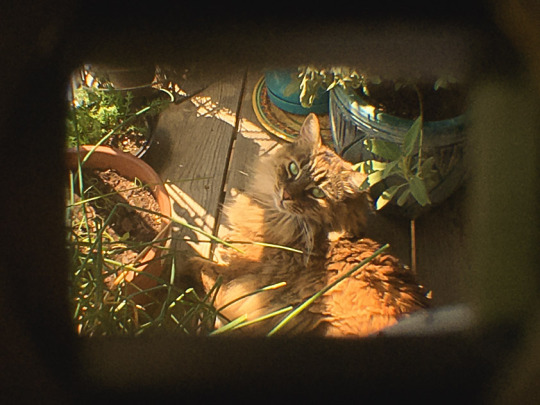

BTW was this interesting? Would anyone like to see reviews of other cameras I've used? Petri FT, Nikon F100 (my usual 35mm), Minolta SRT 101, Minolta XD5 (my secondary 35mm), 4x5 view camera, Sony HVC-2400 video tube camera, Kodak ADVANTiX F350 (my first camera as a kid), Polaroid Automatic 250 Land Camera?
#vintage camera#1950s camera#Argus#ann arbor#camera review#1950s#1960s#camera#Argus C3 Match-matic#Argus camera#ann arbor michigan#michigan#C3#Match-matic#1960s camera#vintage camera review#tech#photography#maisy#cats of tumblr
3 notes
·
View notes
Text
SS-GB
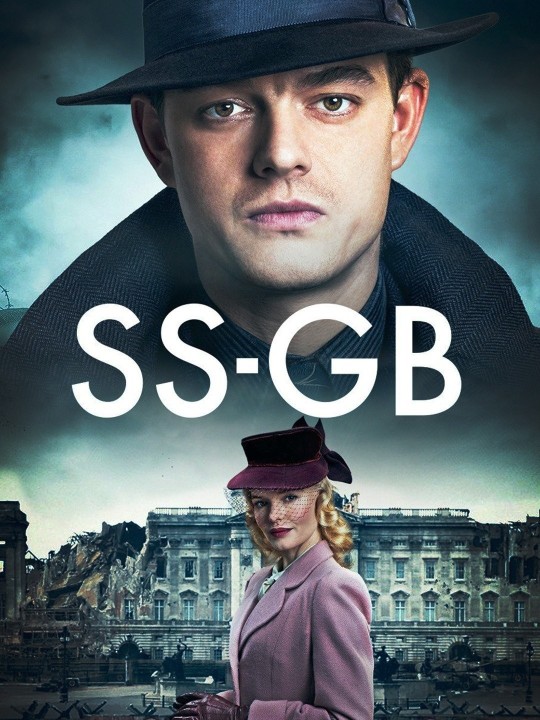
What is the koinos kosmos (common world) and mutually assumed knowledge the series shares with viewers?
Similarly to High Castle, the show SS-GB is placed in a Post-WW2 alternate reality where Germany emerged victorious(211). The first scene of the first episode is introduced with the subtitle, “London. 14th November 1941 - Fourteen months after Germany won the Battle of Britain - The Resistance movement fights on”(2:08). In general, the show assumes a basic knowledge about World War II in the viewer, but obviously it has to mention the alternate outcome of the war.
How does the series depict cultural hybridity through the alerted history’s role in reflecting and reshaping cultural assumptions?
The episode at many points seems to highlight the imperialistic nature of post-war reality. At one point, a condescending remark is made by a Nazi that the British protagonist can be assumed to know German because he took “modern languages” in university(33:44). In addition to the fact that German is referred to as a more modern language, this assumption bears close resemblance to the diffusion of English as the international language in the Post-WW2 world. This dynamic of reversed imperialism seems to put the English speaking viewers of the show in the shoes of non-English speakers. A similar reversed imperialism element is used in High Castle as well, yielding interpretations such as a questioning of hegemony or a bringing to attention of a mindless inattention to “the nature of their actions” on the part of the American viewer(218). More broadly, it seems that the use of multiple languages in the film makes reference to the process of the international cultural hybridization that took place Post-WW2.
How does the series depict the power of understanding world-creation?
Since the show isn’t placed that long after its departure from real history, it seems that the film doesn’t require much sensory imagination, but the plotline does require an integrated interpersonal depiction of British society under German occupation. On the other hand, The Man in the High Castle is placed decades after SS-GB, so there is fundamentally a broader necessity for focus on world-creation in the case of the former(212).
In what ways do formulations of the past, present, and future engage with prospective realities of what might have been and what might be in the series’ alerted history?
It seems like the true historical outcome of WW2 is used as a model in depicting a post-war scenario, and it also seems that the characteristics of other countries occupied by Nazi Germany bear resemblance to this depiction of Britain.
How do multiple realities or contemplations of multiple realities merge with questions of authenticity?
One element that I noticed about contemplation of the SS-GB reality is a lack of brightness throughout the first episode, which indicates the dystopian nature of their world. In addition, the episode’s exclusive use of only warm or overcast lighting creates the suggestion of the show’s setting in 1940’s London. Both of these uses of lighting seem to suspend disbelief in the viewer specifically regarding the setting and mood. In terms of High Castle, I haven’t seen the lighting of the film myself and the reading makes no mention of lighting to my knowledge.
youtube
17 notes
·
View notes
Text
interesting how the overlapping relationships in design for living (film) are discussed by censors in what is deemed appropriate... i thought the "no sex" = platonic ending was weird. the ending lip kisses are a direct subversion of when earlier in the film they first brokered the agreement and gilda refused to kiss the boys on the lips, only their foreheads. it is a logical conclusion that forehead kiss = platonic, lip kiss = sexual; beginning = platonic, ending = sexual. so the "no sex" line makes no sense, unless outside forces are considered. maybe it was a cheap way to circumvent censorship of overlapping (polyamorous) relationships. i didnt think i was right until i read the prod code office (no indication who wrote this) saying the same thing: "In earlier sequence, script indicated that the three live together on a gentleman’s agreement of no sex, but the portrayal is very likely to indicate loose sex relationship which may become inadmissible under the Code." (jul 29, 1933) albeit they refer to the FIRST "no sex" agreement, which i hadnt considered because it made sense in the context of the film theyd try a platonic relationship first... in fact that is the late act 1 tension lol.
these overlapping relationships are talked about a few times by the film's censor, james wingate. it seemed like affections were fineee as long as she wasnt having sex with both of them. which is hilarious considering the whole point is they have overlapping affairs. 1. in a letter to paramount about the script, according to context i assume to be the morning-after scene when gilda cheats on cooper with march -- "Page G-8: We believe that the dialogue along here indicated too specifically that the girl has been having an affair with both men." (jun 19) in the same letter, wingate says that a key thing they have to be careful with is placing march in bedroom separate to gilda's, in order to avoid the implication she slept with him. 2. in a letter to hays -- "The basic story - three people who find, there is something more important in life than sex - should be satisfactory under the Code..." (jun 26) funniest thing you can say about a sex comedy.
there was also a related note from the BRITISH censors (feb 27, 1935 -- which is wayy later than when the film debuted in the uk mid 1934, so idk what the discrepancy is about), that reads: "Reel 1 -- Eliminate dialogue suggesting Tom and Gilda are already lovers" which in context suggests the scenes before the first agreement... my point is censors and filmmakers anticipated and reacted, so who's to say what IS subtext EVEN in a pre code film
#movies#media research#? i dont have a tag#im sure this is talked about in research a lot but i like this film and want to make my own connections lol#even the pre code wikipedia holds interesting info about how filmmakers made things extra explict to run what they actually#wanted to
6 notes
·
View notes
Text
just saw the new Wolf Man here's my post of thoughts and spoilers
-ok so I love the daughter being named Ginger as a reference to Ginger Snaps. Leigh Whannell's horror references in movies always feel like fun tributes and not gimmicky and I love when a horror director loves and respects the genre
-everyone is rightfully talking about him right now but I could really feel David Lynch's influence right from the beginning. The wide views of rural PNW scenes that can feel both familiar and unsettling, because we know what can happen in the woods, in small towns, where no one can see. The horror of family secrets that is mundane but feels otherwordly in its dread, the horrors that hide in plain sight in the All-American Family. Looking into your father and seeing a monster, looking at your daughter and seeing her look at you the way you looked at your monster. The audio in the transformation sequence when Blake can no longer understand human speech also definitely evoked the backwards-speech in the Black Lodge for me.
-I watched the og Wolf Man from 1941 the other day so I'd have context for this movie. In the 1941 movie, the Wolf Man is an Anglo-Welsh nobleman. Without knowing many spoilers for the new movie, I thought the Wolf Man of 2025 was just a normal guy from the US. But I think that was the point. I think Whannell translated the cultural context so that the Wolf Man is the heir not to British imperialism but the son of a modern, American settler colonialist active in neocolonialism. 1941's Wolf Man is considered a legend among the local Welsh, but not truly believed in; the local Romani are exposed to the truth of the Wolf Man's existence, but they are disregarded. The "modern, civilized" colonial mindset in the original film is what enables the horror and the tragedy to unfold.
in the 2025 film, Blake begins as the young son of a white PNW off-the-grid survivalist in 1995. The film's title cards did make me a little nervous with the reference to local indigenous folklore- so many times there have been books and movies that lay the blame for the horror on a "Native American curse" or a "haunted burial ground" or more recently the uwucryptidification of a specific entity that these white horror creators have no business talking about. But I trusted Leigh Whannell, and the blame, or responsibility, lies not in the indigenous people or the land but in those who would claim the land while arrogantly seeing it as an empty enemy to tame. From the beginning it is established that the monster is the settler. The ideas of terra nullius and Westward Expansion are present in the modern day, as Blake's father indoctrinates him with this cultlike ideology. The setup of the cabin down to the skull flag on the wall indicates political extremist ideology motivating the father in his lifestyle: The land is theirs because they have papers that say they own it. The land is dangerous so it must be ruled, not trusted or loved, but dominated and outwitted. The man of the house rules the family. Everyone does what he says, because this paternalism that gives him rule over his family is the same paternalism that gives him rule over the land he claims as his own. It is an old ideology. It is the original sin of Blake's family, and it is far from unique.
It is not the land that makes this long opening scene so ominous. It is the people who have claimed it, and their descendants, who perpetuate and benefit from historic horrors that enable them to own these vast swaths of land in woods where no people seem to be. The monster is the settler because colonialism is by nature monstrous. These themes I feel are present in one of Whannell's early films, Dying Breed, where he had a lead acting role but did not write or direct the movie, I nonetheless think this is one of the influences on Wolf Man.
-All the same, Blake appears as an adult who has done his best to overcome his upbringing, but is not a perfect parent. Many people seem to have called attention to the theme of intergenerational trauma/abuse which is certainly a part of the film. I don't necessarily think the messaging is as bad as some people have taken it, because I don't think it's saying that Blake was doomed to be a bad parent by his traumatic past. Part of this is that Wolf Man is a remake of the original movie and like so many other stories popularized by these classic Universal Horror films the monster always dies.
Blake's father is the Wolf Man, which is maybe an unsurprising reveal, but it works thematically. Blake's father became the Wolf Man presumably after hunting for the previous Wolf Man, who was likely also another man like him. It is his entitlement to rule the land, which he justifies by the fear that the Wolf Man has invoked in him, that sends him on his hunt that presumably transformed him, leaving him dead to the world. (Not even his fellow survivalist friend wanted to join him.) And so years later, Blake's inheritance comes. Keys to the old farmhouse, which he does not know how to get to at first. has he forgotten, has he repressed it- does he think it all looks the same? It is ambiguous.
Blake may be the titular monster, but his monster is his father. Blake fights his father, and fights himself, because he is struggling against becoming his father. Metaphorically and literally, this has been true since we first see Blake as an adult. He tells Ginger that sometimes fathers are so afraid they become the thing that their children are afraid of. Both Blake and his father are Wolf Men, coming full circle to being stalked by the previous Wolf Man. It doesn't make much of a difference how exactly the process began in terms of supernatural logic and lore, and I like that it's never really explained. Blake's past was always going to come for him one way or the other. It was what he did with it that made the difference. Blake, fighting for his life, kills his father, only after his death realizing that the other Wolf Man was his father, that his father made him a Wolf Man, too. His father tried to protect them from the Wolf Man as a child - but like Blake said, fathers can be so afraid they become what their children are afraid of. Blake does not kill his daughter- Ginger realizes he is trying to get through to her, even though mostly he is impossible to understand and cannot understand others. (To be a Wolf Man is to be neither wolf nor man- completely isolated and alone. I like the effects of the transformation actually, and how the mostly humanoid, rather un-wolflike appearance of the Wolf Man emphasizes the loss of humanity and the struggle to retain the self of the man.)
The movie ends in a full circle moment. In the beginning, young Blake and his father look over the view of the valley, the view that Blake's father speaks of covetously as if he owns it, but also with the reassurance to Blake that looking at the valley makes you think everything will be okay. In the end, Blake's transformation does not reverse when the sun rises, and he is shot when Ginger realizes he is trying to ask Charlotte to kill him. Charlotte and Ginger, parent and child, go to the valley and look over the view. Charlotte's gun in her hand, like Blake's father's gun. But will everything be okay? Can the cycle be broken? With Blake dead, his and his father's land is Ginger's inheritance now. That's the problem.
The end has been criticized for a lack of closure, but like I said, the Wolf Man always dies. It's by nature anticlimactic, just as it is when Blake receives notice that his father has been legally declared dead. The monster always dies, even if the system that created the monstrosity doesn't. The monster dies, then what? It's up to us what we become after.
1 note
·
View note
Text
Knives Out Reference Guide
hello it’s your friendly neighborhood obsessive murder mystery fan here. the knives out films are delightful for a number of reasons, one of which is that rian johnson is a huuuuuge movie nerd and loves to include references and hat tips in his films. i have had great fun recognizing those references, so here is a little guide! some of this is based on things johnson has said and some of it on my own observations. i’ll indicate which is which for the purists.
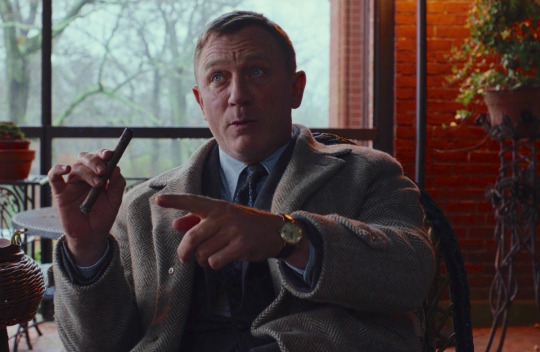
first off, if you’re not interested in having these pointed out to you but want a viewing list, here it is! i’ll put everything else under a cut (which will have glass onion spoilers, so beware). these are great movies for knives out reasons but also for normal film reasons, and i highly recommend them.
Sleuth (1972) Death on the Nile (1978) The Last of Sheila (1973) Evil Under the Sun (1982)
First off: Benoit Blanc himself.
Blanc is very clearly meant to be an homage to gentlemen sleuths of the past, and Johnson even gives us a clue as to which gentleman sleuth he was thinking of with Blanc, with his Southern gentleman amidst the Northerners aping Hercule Poirot’s Belgian-amongst-the-Brits. Johnson has also said that Peter Ustinov is his favourite portrayer of Poirot (fun fact: he was also Agatha Christie’s!--not that she lived to see David Suchet take on the role), and personally I think having Blanc direct the questioning from the piano in Knives Out was an echo of Poirot at the piano in a similar scene in Death on the Nile.
That said, I think there’s a lot of Miss Marple (and Jessica Fletcher, who is herself a modern Miss Marple) in Blanc. The way he has a tendency to observe while deputizing a younger assistant to do the actual snooping for him is very Jane Marple. And he weaponizes the lil-ol’-me Southern gentleman act in much the way Marple made use of the assumptions people in her day and age had about retiring spinsters.

now let’s get into the FILMS. the first one is easy, because it’s really just Sleuth. (1972. i cannot stress this enough--Sleuth 1972.) it does not share a plot, but Knives Out is clearly paying a lot of tribute. Sleuth is a film in which two men, one older and richer and laurence olivier and the other younger and poorer and michael caine, attempt to outwit one another in order to win the woman they both love but who we never see (and yes it’s very very homoerotic). (fun fact: Sleuth was originally a play by Anthony Schaffer--who also wrote the screenplay for Death on the Nile!--who based the elder character in part on Stephen Sondheim, who loved to play games.) it’s set entirely inside the rambling manor house belonging to olivier’s character, a mystery writer, and it’s full of figurines and automatons, and otherwise weird old shit. you seeing how this lines up?
there’s even a very direct tribute in the form of the sailor you see almost immediately in the film.
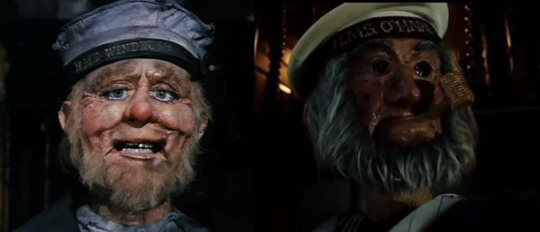
however, aside from the setting and the blueprint for harlan’s character, there aren’t a lot of similarities between Knives Out and Sleuth. Knives Out is much more a play on general mystery tropes than it is a specific mystery movie.
Glass Onion is very much the opposite.
(FROM THIS POINT ON, GLASS ONION SPOILERS ABOUND)
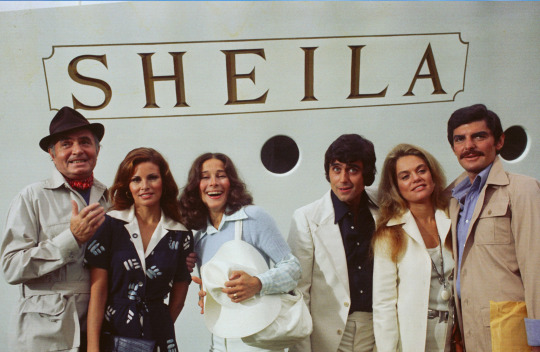
Glass Onion is playing very deliberately on The Last of Sheila. The Last of Sheila (written by Anthony Perkins and Stephen Sondheim name a more iconic duo i’ll wait) is about a wealthy and powerful man who invites a group of old friends onto his yacht (”Sheila”) in order to play a series of games (i see u Stephen) and perhaps solve a mystery? (the mystery is who killed his wife, Sheila.) The friends all come in spite of misgivings because they all need something from their host.

Glass Onion is about a wealthy and powerful man who invites a group of old friends onto his private island in order to play a game and solve a mystery (the mystery is who “killed” him). the friends all come in spite of misgivings because they all need something from their host.
so you see what’s he’s done there.
it’s a very loving tribute, and johnson has put his own distinctive spin on it, both with the addition of a detective who nobody expected to be there, as well as the inexperienced assistant whom he’s deputized. but unlike your typical watson and very like marta’s character in Knives Out, helen in Glass Onion has a huge personal stake in solving the mystery. also, of course, Miles is a very specific, recognizable piece of shit.
but door, you might be saying, because you have very closely read this post for some reason, what about Evil Under the Sun? oh, i am so glad you asked!

Evil Under the Sun is another Ustinov Poirot mystery, set in a resort on a private island. The trappings of Glass Onion owe much to it, from the luxury getaway setting (complete with swim fits), to the opportunity to have your characters dress for cocktails, to the “hourly dong” (based on Evil’s “hourly gun”). oh, and i know this was deliberate:

so! that’s what i’ve got! if you noticed other things i missed (i’ve only seen Glass Onion once at this point), please let me know!
#here it is ashleigh!#enjoy!#knives out#glass onion#glass onion spoilers#murder mysteries#rian johnson be my penpal challenge
396 notes
·
View notes
Text
Ateez's Full Storyline Explained - Part 16
Masterlist
Halazia (Z-World)
This entire theory is based on information that can be gathered from the MV, Prologue and Epilogue, Hongjoong’s Q&A shorts and the MV reaction video, as well as what little we're told in the Golden Hourt Part 2 Diary Entries.
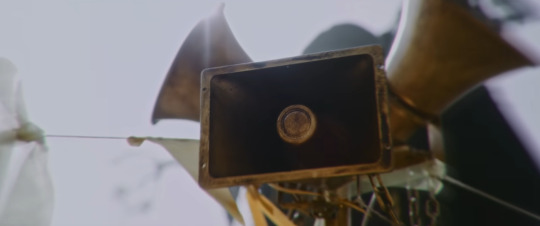
First: the name "Halazia" - it's just a combination of "Hala" from Hala Hala (which can be translated from Sanskrit to 'black mass' or 'time puzzle') and "zia" which refers to the sun -> "Be the light, oh Halazia".
Looking it up, you'll find some information about the Pueblo of Zia where a very specific symbol has been used for hundreds of years among the indigenous people to represent the sun that looks like this:

You'll now also find this symbol on the flag of New Mexico but the actual natives whose ancestors created and passed it down didn't consent to this and now there's a lot of (very justified) debate regarding intellectual property - this part has nothing to do with the Ateez lore, I just thought it was interesting and important to share in case anyone was thinking of getting this symbol tattooed or something.
Theory No. 1 (basically confirmed by Hongjoong in his short lore Q&A vid): we're dealing with neither Ateez, nor the Black Pirates here.
The main indicator to me was the lack of Mingi's "Fix on" and Hongjoongs lil giggles before their respective rap parts (which had previously been a constant, regardless of whether they were acting as Ateez or the Black Pirates).

But aside from that, it also seems like Yunho is the leader of this group with Hongjoong being his right-hand man as opposed to the other way around (and we get to see Yeosang’s birthmark which was previously always covered).
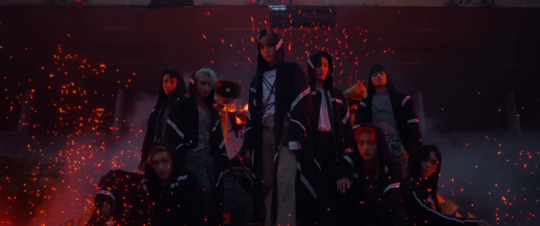
We do still see Hongjoong wearing an armband with the Cromer logo on it - so maybe it's more like Yunho's the public-facing head of the group while Hongjoong's in charge behind the scenes.

All that was ever canonically mentioned about Halazia was a story Left Eye shared in the aforementioned Diary Entries of Golden Hour Part 2: "According to legend, one of the four priest guardians of Halazia gathered the breaths of all of Halazia to create [the Sopro]."
We find out there, that the Sopro is a ruby-red stone used to synchronize people's emotions, making it extremely powerful. Additionally, we also learn that Z and his minions don't know about the Sopro's power, which means it's an object made and used solely by the rebellion.
Based on this information and the state of the city in the background throughout the MV, we can craft a workable theory:
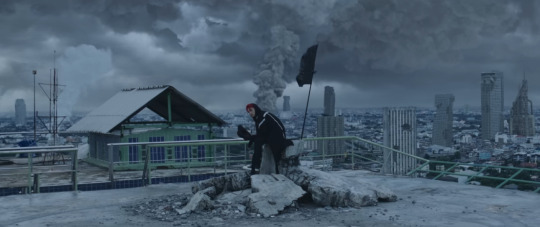
Since we've got Yunho sitting inside a ginormous, shattered Cromer, we can assume that these guys are familiar with the Cromer's power and have utilized it to get here, to Z-World's past, to before Z took over and the exact moment in time when the Sopro was created.
Why do I think this is the past? Because the city is nothing but rubble and, based on real-world history and present situations, we know dictatorships are born in times of economical collapse, war, and destruction. When everything is falling apart and one lone figure promises quick and easy solutions, fearful people will listen and believe anything. And Z, together with his political party, used that to climb to power and enforce their ideals onto the world.
Additionally, I also believe we get to see the creation of the Sopro within this music video. But more on that in a minute.
Side-note: We've seen such a gravitational anomaly as you can see below before during Diary Film after Hongjoong first received the Cromer in the A-World and was alone in the Ateez hideout
Side-note 2: You can find my theory on why a Cromer may be intentionally shattered by someone who understands its powers here)

Going by the lyrics, we can get an idea of what they're all thinking as we see them struggle throughout the video: "No more, keep control! No more, keep your soul!" -> they want to be in charge of their own lives, to feel and have free thought as opposed to the mindless drones Z wants to turn them into.
They know of Z's plans because they saw them realized in their own world, they know of what the microchips will do to them, and they're fighting against it by creating the one object which may set them free: the Sopro. An unassuming, little red stone which can unite people beyond earthly boundaries and circumstances, an object with enough power to pierce through the microchips' influence and set people free so they can rebel alongside them.

Within the music video, as the bell rings, we can see Seonghwa glitch as he gathers "breaths" from the people around him: he's the priest guardian who created the Sopro.
He's the one the legends were created around, the one Left Eye will speak of in the future as they head to the Android Guardians' bunker in search of the Cromer.
He's the one who created the object that would later enable Z-World to be set free. The bluebird we see at the end of Crazy Form carries the Sopro he's creating here.
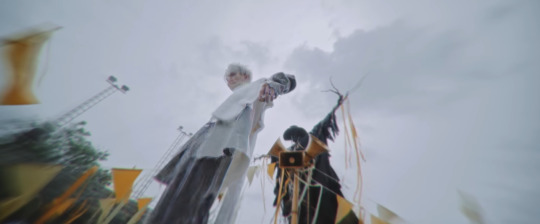
Regarding the Black Pirate outfits we're seeing throughout the video: they're like the ones they wore in their own world.
Without Ateez's help, however, they failed to succeed in putting together the Revolution. In their world, Z won and the Black Pirates could do nothing but run away, flee, escape to another world and hope to help set it free so another version of them may at least find peace where they couldn't.
Which means, perhaps they're burning the Black Pirates' outfits as a funeral ritual, out of frustration and anger at their own shortcomings, or because burning the memories is all they can do to separate themselves from their past.


Regardless, many of the other citizens who are with them in the here and now seem willing to join their cause and their current mission seems to be taking down this anti-gravity orb

I can only make a rather baseless guess as to what the purpose of these things is but since it's actively rising here, it seems to be something newly installed that's meant to rise above city-level.
The central government presumably built and installed it, perhaps to create the first version of the network which connects the populations' microchips, keeping them enslaved and submissive.
To me, that would explain both the fear in the lyrics about returning to their prior state of being pre-awakening, as well as why San is so ready to risk it all to break this thing.
Either way, we've got Yeosang bringing in the chains to tie up the orb.

Based on the skyline compared to the one from the prologue, it seems like the thick smoke pillars might be originating from the crash sites of the other orbs which would mean they already brought down all the other ones successfully and have now reached their last stop.

They wrap the chains around the orb, tie it up all nice and neatly (which must've been a pain in the ass to do since that thing is floating in mid air, makes lightweight shit in its vicinity float and is well, the shape of a super smooth ball) and all start pulling together up until everyone seemingly leaves San to finish the job by himself.



To me, there could be multiple reasons for this: (1) it was always part of the plan (highly unlikely imo), (2) everyone but San lost hope this was gonna work out since they're already exhausted as hell from doing this several times before and don't seem to have made all that much progress and maybe they think they've already done enough since this is seemingly the last orb left, (3) San convinced everyone to leave as they were working/everyone but him got too scared to continue because Android Guardians or another government entity were underway and would've killed or captured them if they were caught.
Either way, it all ends with the orb evaporating the moment it collides with San as if his existence somehow cancelled out the orb's. While this is very likely to be a creative decision since no one wants to see this human embodiment of sunshine get crushed to death, it could also mean San is still alive if he possesses abilities that go beyond a regular human's (like this priest guardian version of Seonghwa does) or if the orb isn't made up of regular matter/material.
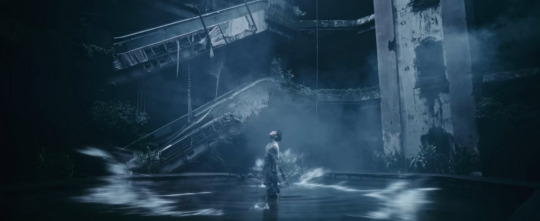
Moving on to the Prologue and Epilogue:
Aside from what I already covered, there are also quite a few other things I want to bring up regarding what we get to see in these two bonus videos, starting with the numbers behind Hongjoong in the Prologue here (which were also pointed out by him in the Making Of video)

You can put these numbers (22152984) and decode them with A1Z26 in which case you'd get this (yes, I still use the Gravity Falls: Break the Code website for this kinda stuff - I refuse to be judged for it):

While this is rather nonsensical, it is quite close to "Bluebird" which would fit the lyrics but it's still just a lil bit unsatisfying since, properly encoded, it should have been "2-12-21-5-2-9-18-4", meaning they forgot a "1" twice.
Regardless, I couldn't find anything better - it can't be coordinates, there's no cipher like this for Hangul that I could find, and using Base64 only gets you "my8" which doesn't make too much sense but Ateez are 8 members so that's nice, I guess.
The first thing that pops up in my search results when I look up the numbers is "Buy 22152984 from Oxygen Electronics" by the way - shout out to life support machine parts you can order online (no affiliation, though I do hope they're an ethical company)
Regarding the numbers, I'll leave it at that for now but if I ever find something that makes more sense, I'll update this post.

Now on to the mysterious blonde person that pops up toward the end of the Prologue and disappears in the blink of an eye as someone walks past.
Seonghwa is the only one who takes note of them and, based on his neutral expression, it doesn't seem to be the first time he's seen them.

Are they the Witness? Perhaps someone who also travelled in from another world? I do think so but we'll come back to it in a moment.
Skipping ahead to the Prologue uploaded yesterday, we're opening with a shot of the bluebird we've already gotten to see in the Prologue and which has also been referenced in the lyrics - it's a symbol of reclaiming freedom, of escaping your shackles, of finding your voice and using it. They've now made it. They've chosen freedom. They've chosen to fight.

The bird's path now guides Seonghwa through the abandoned mall where the orb was brought down and San was "sacrificed". It whistles a small tune and disappears near a lone white-clad figure we've seen before.

Last seen among a small group on the rooftop at the end of the MV, blondie stands by themselves again, though the others aren't far as we'll soon see.
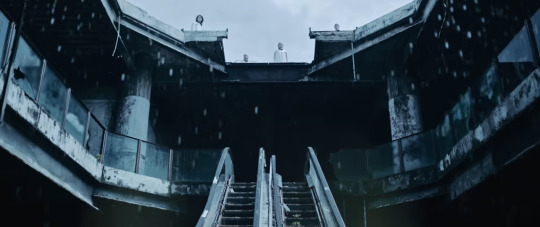
Since the mission is now over, Seonghwa let's his curiosity win and follows the figure up a dark staircase, letting his flashlight guide him.
He finds the group of four from the rooftop standing in a dark room against the backdrop of the smoking skyline behind the large windows - they were waiting for him.

A white flash, rolling thunder and they're gone. Just like after Yeosang broke the Cromer, we also got to witness the Cromer's powers here. This marks the third Cromer, meaning these four are from yet another reality and they've now become Witnesses of our protagonists' achievements.
They also left behind a departing gift: a silver bracelet engraved with the words "Be Free".

Like A-World's Seonghwa, it seems the blonde Witness has also gotten inspired by their world's version of the dancing girl and they've now left behind this bracelet, hoping it'll inspire this world's Seonghwa the way it inspired them.
#ateez#ateez lore#halazia#hongjoong#seonghwa#yunho#yeosang#san#mingi#wooyoung#jongho#the world series
160 notes
·
View notes